|
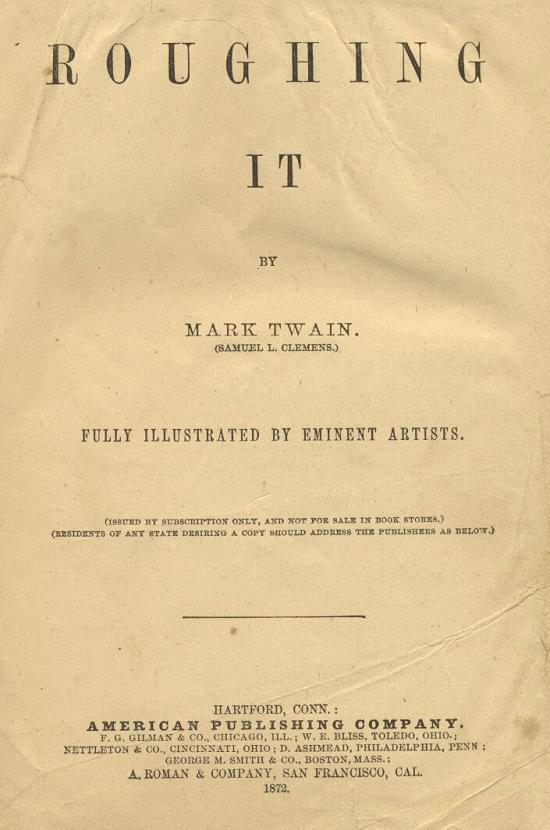  |
|
PREFATORY.This book is merely a personal narrative, and not a pretentious history or a philosophical dissertation. It is a record of several years of variegated vagabondizing, and its object is rather to help the resting reader while away an idle hour than afflict him with metaphysics, or goad him with science. Still, there is information in the volume; information concerning an interesting episode in the history of the Far West, about which no books have been written by persons who were on the ground in person, and saw the happenings of the time with their own eyes. I allude to the rise, growth and culmination of the silver-mining fever in Nevada — a curious episode, in some respects; the only one, of its peculiar kind, that has occurred in the land; and the only one, indeed, that is likely to occur in it. Yes, take it all around, there is quite a good deal of information in the book. I regret this very much; but really it could not be helped: information appears to stew out of me naturally, like the precious ottar of roses out of the otter. Sometimes it has seemed to me that I would give worlds if I could retain my facts; but it cannot be. The more I calk up the sources, and the tighter I get, the more I leak wisdom. Therefore, I can only claim indulgence at the hands of the reader, not justification. THE AUTHOR. |
CONTENTS.. . . .
|
. . . .
|
. . . .
|
 . . . .
|
|
. . . .
|
CHAPTER LXII.After a three months’ absence, I found myself in San Francisco again, without a cent. When my credit was about exhausted, (for I had become too mean and lazy, now, to work on a morning paper, and there were no vacancies on the evening journals,) I was created San Francisco correspondent of the Enterprise, and at the end of five months I was out of debt, but my interest in my work was gone; for my correspondence being a daily one, without rest or respite, I got unspeakably tired of it. I wanted another change. The vagabond instinct was strong upon me. Fortune favored and I got a new berth and a delightful one. It was to go down to the Sandwich Islands and write some letters for the Sacramento Union, an excellent journal and liberal with employees. We sailed in the propeller Ajax, in the middle of winter. The almanac called it winter, distinctly enough, but the weather was a compromise between spring and summer. Six days out of port, it became summer altogether. We had some thirty passengers; among them a cheerful soul by the name of Williams, and three sea-worn old whaleship captains going down to join their vessels. These latter played euchre in the smoking room day and night, drank astonishing quantities of raw whisky without being in the least affected by it, and were the happiest people I think I ever saw. And then there was "the old Admiral — " a retired whaleman. He was a roaring, terrific combination of wind and lightning and thunder, and earnest, whole-souled profanity. But nevertheless he was tender- |
hearted as a girl. He was a raving, deafening, devastating typhoon, laying waste the cowering seas but with an unvexed refuge in the centre where all comers were safe and at rest. Nobody could know the "Admiral" without liking him; and in a sudden and dire emergency I think no friend of his would His Title of "Admiral" was more strictly "official" than any ever worn by a naval officer before or since, perhaps — for it was the voluntary offering of a whole nation, and came direct from the people themselves without any intermediate red tape — the people of the Sandwich Islands. It was a title that came to him freighted with affection, and honor, and appreciation of his unpretending merit. And in testimony of the genuineness of the title it was publicly ordained that an exclusive flag should be devised for him and used solely to welcome his coming and wave him God-speed in his going. From that time forth, whenever his ship was signaled in the offing, or he catted his anchor and stood out to sea, that ensign streamed from the royal halliards on the parliament house and the nation lifted their hats to it with spontaneous accord. Yet he had never fired a gun or fought a battle in his life. |
When I knew him on board the Ajax, he was seventy-two years old and had plowed the salt water sixty-one of them. For sixteen years he had gone in and out of the harbor of Honolulu in command of a whaleship, and for sixteen more had been captain of a San Francisco and Sandwich Island passenger packet and had never had an accident or lost a vessel. The simple natives knew him for a friend who never failed them, and regarded him as children regard a father. It was a dangerous thing to oppress them when the roaring Admiral was around. Two years before I knew the Admiral, he had retired from the sea on a competence, and had sworn a colossal nine-jointed oath that he would "never go within smelling distance of the salt water again as long as he lived." And he had conscientiously kept it. That is to say, he considered he had kept it, and it would have been more than dangerous to suggest to him, even in the gentlest way, that making eleven long sea voyages, as a passenger, during the two years that had transpired since he "retired," was only keeping the general spirit of it and not the strict letter. The Admiral knew only one narrow line of conduct to pursue in any and all cases where there was a fight, and that was to shoulder his way straight in without an inquiry as to the rights or the merits of it, and take the part of the weaker side. — And this was the reason why he was always sure to be present at the trial of any universally execrated criminal to oppress and intimidate the jury with a vindictive pantomime of what he would do to them if he ever caught them out of the box. And this was why harried cats and outlawed dogs that knew him confidently took sanctuary under his chair in time of trouble. In the beginning he was the most frantic and bloodthirsty Union man that drew breath in the shadow of the Flag; but the instant the Southerners began to go down before the sweep of the Northern armies, he ran up the Confederate colors and from that time till the end was a rampant and inexorable secessionist. He hated intemperance with a more uncompromising ani- |
mosity than any individual I have ever met, of either sex; and he was never tired of storming against it and beseeching friends and strangers alike to be wary and drink with moderation. And yet if any creature had been guileless enough to intimate that his absorbing nine gallons of "straight" whiskey during our voyage was any fraction short of rigid or inflexible abstemiousness, in that self-same moment the old man would have spun him to the uttermost parts of the earth in the whirlwind of his wrath. Mind, I am not saying his whisky ever affected his head or his legs, for it did not, in even the slightest degree. He was a capacious container, but he did not hold enough for that. He took a level tumblerful of whisky every morning before he put his clothes on — "to sweeten his bilgewater," he said. — He took another after he got the most of his clothes on, "to settle his mind and give him his bearings." He then shaved, and put on a clean shirt; after which he recited the Lord’s Prayer in a fervent, thundering bass that shook the ship to her kelson and suspended all conversation in the main cabin. Then, at this stage, being invariably "by the head," or "by the stern," or "listed to port or starboard," he took one more to "put him on an even keel so that he would mind his hellum and not miss stays and go about, every time he came up in the wind." — And now, his state-room door swung open and the sun of his benignant face beamed redly out upon men and women and children, and he roared his "Shipmets a’hoy!" in a way that was calculated to wake the dead and precipitate the final resurrection; and forth he strode, a picture to look at and a presence to enforce attention. Stalwart and portly; not a gray hair; broadbrimmed slouch hat; semi-sailor toggery of blue navy flannel — roomy and ample; a stately expanse of shirt-front and a liberal amount of black silk neck-cloth tied with a sailor knot; large chain and imposing seals impending from his fob; awe-inspiring feet, and "a hand like the hand of Providence," as his whaling brethren expressed it; wrist-bands and sleeves pushed back half way to the elbow, out of respect for the warm weather, and exposing hairy arms, gaudy with red and blue anchors, ships, and goddesses of liberty tattooed in India ink. |
But these details were only secondary matters — his face was the lodestone that chained the eye. It was a sultry disk, glowing determinedly out through a weather beaten mask of mahogany, and studded with warts, seamed with scars, "blazed" all over with unfailing fresh slips of the razor; and with cheery eyes, under shaggy brows, contemplating the world from over the back of a gnarled crag of a nose that loomed vast and lonely out of the undulating immensity that spread away from its foundations.
The Admiral seldom read newspapers; and when he did he never believed anything they said. He read nothing, and believed in nothing, but "The Old Guard," a secession periodical published in New York. He carried a dozen copies of it with him, always, and referred to them for all required information. If it was not there, he supplied it himself, out of a bountiful fancy, inventing history, names, dates, and every thing else necessary to make his point good in an argument. Consequently he was a formidable antagonist in a dispute. Whenever he swung clear of the record and began to create history, the enemy was helpless and had to surrender. Indeed, the enemy |
could not keep from betraying some little spark of indignation at his manufactured history — and when it came to indignation, that was the Admiral’s very "best hold." He was always ready for a political argument, and if nobody started one he would do it himself. With his third retort his temper would begin to rise, and within five minutes he would be blowing a gale, and within fifteen his smoking-room audience would be utterly stormed away and the old man left solitary and alone, banging the table with his fist, But he found his match at last, and before a full company. At one time or another, everybody had entered the lists against him and been routed, except the quiet passenger Williams. He had never been able to get an expression of opinion out of him on politics. But now, just as the Admiral drew near the door and the company were about to slip out, Williams said: "Admiral, are you certain about that circumstance concerning the clergymen you mentioned the other day?" — referring to a piece of the Admiral’s manufactured history. Every one was amazed at the man’s rashness. The idea of deliberately inviting annihilation was a thing incomprehensible. The retreat came to a halt; then everybody sat down again wondering, to await the upshot of it. The Admiral himself was as surprised as any one. He paused in the door, with his red handkerchief half raised to his sweating face, and contemplated the daring reptile in the corner. |
"Certain of it? Am I certain of it? Do you think I’ve been lying about it? What do you take me for? Anybody that don’t know that circumstance, don’t know anything; a child ought to know it. Read up your history! Read it up — — — — , and don’t come asking a man if he’s certain about a bit of ABC stuff that the very southern niggers know all about." Here the Admiral’s fires began to wax hot, the atmosphere thickened, the coming earthquake rumbled, he began to thunder and lighten. Within three minutes his volcano was in full irruption and he was discharging flames and ashes of indignation, belching black volumes of foul history aloft, and vomiting red-hot torrents of profanity from his crater. Meantime Williams sat silent, and apparently deeply and earnestly interested in what the old man was saying. By and by, when the lull came, he said in the most deferential way, and with the gratified air of a man who has had a mystery cleared up which had been puzzling him uncomfortably: "Now I understand it. I always thought I knew that piece of history well enough, but was still afraid to trust it, because there was not that convincing particularity about it that one likes to have in history; but when you mentioned every name, the other day, and every date, and every little circumstance, in their just order and sequence, I said to myself, this sounds something like — this is history — this is putting it in a shape that gives a man confidence; and I said to myself afterward, I will just ask the Admiral if he is perfectly certain about the details, and if he is I will come out and thank him for clearing this matter up for me. And that is what I want to do now — for until you set that matter right it was nothing but just a confusion in my mind, without head or tail to it." Nobody ever saw the Admiral look so mollified before, and so pleased. Nobody had ever received his bogus history as gospel before; its genuineness had always been called in question either by words or looks; but here was a man that not only swallowed it all down, but was grateful for the dose. He was taken a back; he hardly knew what to say; even his profanity |
failed him. Now, Williams continued, modestly and earnestly: "But Admiral, in saying that this was the first stone thrown, and that this precipitated the war, you have overlooked a circumstance which you are perfectly familiar with, but which has escaped your memory. Now I grant you that what you have stated is correct in every detail — to wit: that on the 16th of October, 1860, two Massachusetts clergymen, named Waite and Granger, went in disguise to the house of John Moody, in Rockport, at dead of night, and dragged forth two southern women and their two little children, and after tarring and feathering them conveyed them to Boston and burned them alive in the State House square; and I also grant your proposition that this deed is what led to the secession of South Carolina on the 20th of December following. Very well." [Here the company were pleasantly surprised to hear Williams proceed to come back at the Admiral with his own invincible weapon — clean, pure, manufactured history, without a word of truth in it.] "Very well, I say. But Admiral, why overlook the Willis and Morgan case in South Carolina? You are too well informed a man not to know all about that circumstance. Your arguments and your conversations have shown you to be intimately conversant with every detail of this national quarrel. You develop matters of history every day that show plainly that you are no smatterer in it, content to nibble about the surface, but a man who has searched the depths and possessed yourself of everything that has a bearing upon the great question. Therefore, let me just recall to your mind that Willis and Morgan case — though I see by your face that the whole thing is already passing through your memory at this moment. On the 12th of August, 1860, two months before the Waite and Granger affair, two South Carolina clergymen, named John H. Morgan and Winthrop L. Willis, one a Methodist and the other an Old School Baptist, disguised themselves, and went at midnight to the house of a planter named Thompson — Archibald F. Thompson, Vice President under Thomas Jefferson, — and took thence, at midnight, his widowed aunt, (a Northern woman,) and her adopted child, an orphan named |
Mortimer Highie, afflicted with epilepsy and suffering at the time from white swelling on one of his legs, and compelled to walk on crutches in consequence; and the two ministers, in spite of the pleadings of the victims, dragged them to the bush, tarred and feathered them, and afterward burned them at the stake in the city of Charleston. You remember perfectly well what a stir it made; you remember perfectly well that even the Charleston Courier stigmatized the act as being unpleasant, of questionable propriety, and scarcely justifiable, and likewise that it would not be matter of surprise if retaliation ensued. And you remember also, that this thing was the cause of the Massachusetts outrage. Who, indeed, were the two Massachusetts ministers? and who were the two Southern women they burned? I do not need to remind you, Admiral, with your intimate knowledge of history, that Waite was the nephew of the woman burned in Charleston; that Granger was her cousin in the second degree, and that the woman they burned in Boston was the wife of John H. Morgan, and the still loved but divorced wife of Winthrop L. Willis. Now, Admiral, it is only fair that you should acknowledge that the first provocation came from the Southern preachers and that the Northern ones were justified in retaliating. In your arguments you never yet have shown the least disposition to withhold a just verdict or be in anywise unfair, when authoritative history condemned your position, and therefore I have no hesitation in asking you to take the original blame from the Massachusetts ministers, in this matter, and transfer it to the South Carolina clergymen where it justly belongs." The Admiral was conquered. This sweet spoken creature who swallowed his fraudulent history as if it were the bread of life; basked in his furious blasphemy as if it were generous sunshine; found only calm, even-handed justice in his rampart partisanship; and flooded him with invented history so sugarcoated with flattery and deference that there was no rejecting it, was "too many" for him. He stammered some awkward, profane sentences about the — — — — Willis and |
Morgan business having escaped his memory, but that he "remembered it now," and then, under pretence of giving Fan some medicine for an imaginary cough, drew out of the battle and went away, a vanquished man. Then cheers and laughter went up, and Williams, the ship’s benefactor was a hero. The Admiral’s power was broken. After that, if he began argument, somebody would bring Williams, and the old man would grow weak and begin to quiet down at once. And as soon as he was done, Williams in his dulcet, insinuating way, would invent some history (referring for proof, to the old man’s own excellent memory and to copies of "The Old Guard" known not to be in his possession) that would turn the tables completely and leave the Admiral all abroad and helpless. By and by he came to so dread Williams and his gilded tongue that he would stop talking when he saw him approach, and finally ceased to mention politics altogether, and from that time forward there was entire peace and serenity in the ship. |
CHAPTER LXIII.On a certain bright morning the Islands hove in sight, lying low on the lonely sea, and everybody climbed to the upper deck to look. After two thousand miles of watery solitude the vision was a welcome one. As we approached, the imposing promontory of Diamond Head rose up out of the ocean its rugged front softened by the hazy distance, and presently the details of the land began to make themselves manifest: first the line of beach; then the plumed coacoanut trees of the tropics; then cabins of the natives; then the white town of Honolulu, said to contain between twelve and fifteen thousand inhabitants spread over a dead level; with streets from twenty to thirty feet wide, solid and level as a floor, most of them straight as a line and few as crooked as a corkscrew. The further I traveled through the town the better I liked it. Every step revealed a new contrast — disclosed something I was unaccustomed to. In place of the grand mud-colored brown fronts of San Francisco, I saw dwellings built of straw, adobies, and cream-colored pebble-and-shell- conglomerated coral, cut into oblong blocks and laid in cement; also a great number of neat white cottages, with green window-shutters; in place of front yards like billiard-tables with iron fences around them, I saw these homes surrounded by ample yards, thickly clad with green grass, and shaded by tall trees, through whose dense foliage the sun could scarcely penetrate; in place of the customary geranium, calla lily, etc., languishing in dust and general debility, I saw luxurious banks and thickets of flowers, fresh as a meadow after a rain, and glowing with the |
richest dyes; in place of the dingy horrors of San Francisco’s pleasure grove, the "Willows," I saw huge-bodied, wide-spreading forest trees, with strange 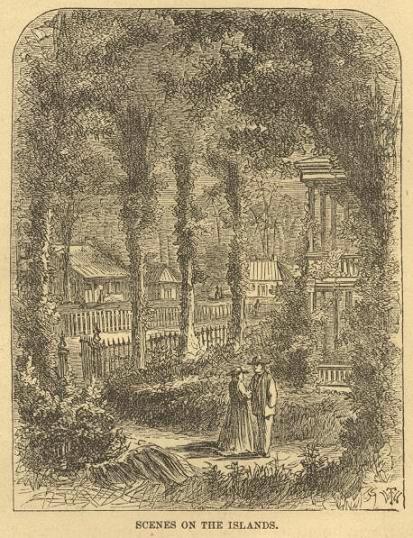
names and stranger appearance — trees that cast a shadow like a thunder-cloud, and were able to stand alone without being tied to green poles; in place of gold fish, wiggling around in glass globes, assuming countless shades and degrees of distortion through the magnifying and diminishing qualities of their transparent prison houses, I saw cats — Tom-cats, Mary Ann cats, long-tailed cats, bob-tailed cats, blind cats, one-eyed cats, wall-eyed cats, cross-eyed cats, gray cats, black cats, white cats, yellow cats, striped cats, spotted cats, tame cats, wild cats, singed cats, individual cats, groups of cats, platoons of cats, companies of cats, regiments of cats, armies of cats, multitudes of cats, millions of cats, and all of them sleek, fat, lazy and sound asleep. I looked on a multitude of people, some white, in white coats, vests, pantaloons, even white cloth shoes, made snowy with chalk duly laid on every morning; but the majority of |
the people were almost as dark as negroes — women with comely features, fine black eyes, rounded forms, inclining to the voluptuous, clad in a single In place of roughs and rowdies staring and blackguarding on the corners, I saw long-haired, saddle-colored Sandwich Island maidens sitting on the ground in the shade of corner houses, gazing indolently at whatever or whoever happened along; instead of wretched cobble-stone pavements, I walked on a firm foundation of coral, built up from the bottom of the sea by the absurd but persevering insect of that name, with a light layer of lava and cinders overlying the coral, belched up out of fathomless perdition long ago through the seared and blackened crater that stands dead and harmless in the distance now; instead of cramped and crowded street-cars, I met dusky native women sweeping by, free as the wind, on fleet horses and astride, with gaudy riding-sashes, streaming like banners behind them; instead of the combined stenches of Chinadom and Brannan street slaughter-houses, I breathed the balmy fragrance of jessamine, oleander, and the Pride of India; in place of the hurry and bustle and noisy confusion of San Francisco, I moved in the midst of a Summer calm as tranquil as dawn in the Garden of Eden; in place of the Golden City’s skirting sand hills and the placid bay, I saw on the one side a frame-work of tall, |
precipitous mountains close at hand, clad in refreshing green, and cleft by deep, cool, chasm-like valleys — and in front the grand sweep of the ocean: a brilliant, transparent green near the shore, bound and bordered by a long white line of foamy spray dashing against the reef, and further out the dead blue water of the deep sea, flecked with "white caps," and in the far horizon a single, lonely sail — a mere accent-mark to emphasize a slumberous calm and a solitude that were without sound or limit. When the sun sunk down — the one intruder from other realms and persistent in suggestions of them — it was tranced luxury to sit in the perfumed air and forget that there was any world but these enchanted islands. 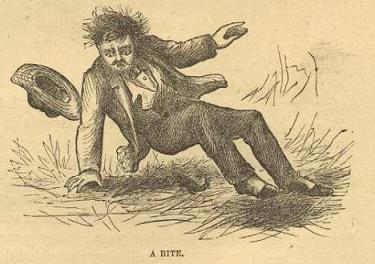
It was such ecstacy to dream, and dream — till you got a bite. A scorpion bite. Then the first duty was to get up out of the grass and kill the scorpion; and the next to bathe the bitten place with alcohol or brandy; and the next to resolve to keep out of the grass in future. Then came an adjournment to the bed-chamber and the pastime of writing up the day’s journal with one hand and the destruction of mosquitoes with the other — a whole community of them at a slap. Then, observing an enemy approaching, — a hairy tarantula on stilts — why not set the spittoon on him? It is done, and the projecting ends of his paws give a luminous idea of the magnitude of his reach. Then to bed and become a promenade for a centipede with forty-two legs on a side and every foot hot enough to burn a |
hole through a raw-hide. More soaking with alcohol, and a resolution to examine the bed before entering it, in future. Then wait, and suffer, till all the mosquitoes in the neighborhood We had an abundance of fruit in Honolulu, of course. Oranges, pine‑apples, bananas, strawberries, lemons, limes, mangoes, guavas, melons, and a rare and curious luxury called the chirimoya, which is deliciousness itself. Then there is the tamarind. I thought tamarinds were made to eat, but that was probably not the idea. I ate several, and it seemed to me that they were rather sour that year. They pursed up my |
CHAPTER LXIV.In my diary of our third day in Honolulu, I find this: I am probably the most sensitive man in Hawaii to-night — especially about sitting down in the presence of my betters. I have ridden fifteen or twenty miles on horse-back since 5 P.M. and to tell the honest truth, I have a delicacy about sitting down at all. An excursion to Diamond Head and the King’s Coacoanut Grove was planned to-day — time, 4:30 P.M. — the party to consist of half a dozen gentlemen and three ladies. They all started at the appointed hour except myself. I was at the Government prison, (with Captain Fish and another whaleship-skipper, Captain Phillips,) and got so interested in its examination that I did not notice how quickly the time was passing. Somebody remarked that it was twenty minutes past five o’clock, and that woke me up. It was a fortunate circumstance that Captain Phillips was along with his "turn out," as he calls a top-buggy that Captain Cook brought here in 1778, and a horse that was here when Captain Cook came. Captain Phillips takes a just pride in his driving and in the speed of his horse, and to his passion for displaying them I owe it that we were only sixteen minutes coming from the prison to the American Hotel — a distance which has been estimated to be over half a mile. But it took some fearful driving. The Captain’s whip came down fast, and the blows started so much dust out of the horse’s hide that during the last half of the journey we rode through an impenetrable fog, and ran by a pocket compass in the hands of Captain Fish, a whaler of twenty-six years experience, who sat there through the perilous voyage as self-possessed as if he had been on the euchre-deck of his own |
ship, and calmly said, "Port your helm — port," from time to time, and "Hold her a little free — steady — so — so," and "Luff — hard down to starboard!" and never once lost his presence of mind or betrayed the least anxiety by voice or manner. When we came to anchor at last, and Captain Phillips looked at his watch and said, "Sixteen minutes — I told you it was in her! that’s over three miles an hour!" I could see he felt entitled to a compliment, and so I said I had never seen lightning go like that horse. And I never had. The landlord of the American said the party had been gone nearly an hour, but that he could give me my choice of several horses that could overtake them. I said, never mind — I preferred a safe horse to a fast one — I would like to have an excessively gentle horse — a horse with no spirit whatever — a lame one, if he had such a thing. Inside of five minutes I was mounted, and perfectly satisfied with my outfit. I had no time to label him "This is a horse," and so if the public took him for a sheep I cannot help it. I was satisfied, and that was the main thing. I could see that he had as many fine points as any man’s horse, and so I hung my hat on one of them, behind the saddle, and swabbed the perspiration from my face and started. I named him after this island, "Oahu" (pronounced O-waw-hee). The first gate he came to he started in; I had neither whip nor spur, and so I simply argued the case with him. He resisted argument, but ultimately yielded to insult and abuse. He backed out of that gate and steered for another one on the other side of the street. I triumphed by my former process. Within the next six hundred yards he crossed the street fourteen times and attempted thirteen gates, and in the meantime the tropical sun was beating down and threatening to cave the top of my head in, and I was literally dripping with perspiration. He abandoned the gate business after that and went along peaceably enough, but absorbed in meditation. I noticed this latter circumstance, and it soon began to fill me with apprehension. I said to my self, this creature is planning some new outrage, some fresh deviltry or other — no horse ever thought over a subject so profoundly as this one is doing just for nothing. The more this |
thing preyed upon my mind the more uneasy I became, until the suspense became almost unbearable and I dismounted to see if there was anything wild in his eye — for I had heard that the eye of this noblest of our domestic animals is very expressive. I cannot describe what a load of 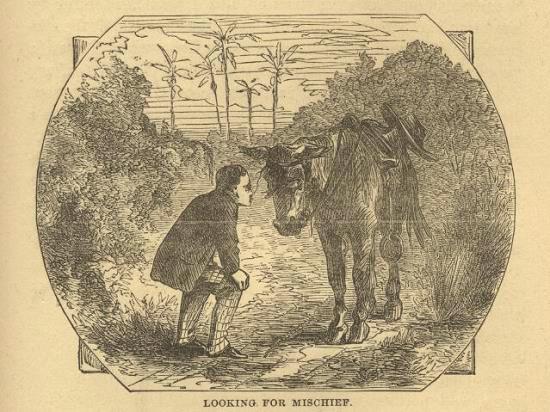 anxiety was lifted from my mind when I found that he was only asleep. I woke him up and started him into a faster walk, and then the villainy of his nature came out again. He tried to climb over a stone wall, five or six feet high. I saw that I must apply force to this horse, and that I might as well begin first as last. I plucked a stout switch from a tamarind tree, and the moment he saw it, he surrendered. He broke into a convulsive sort of a canter, which had three short steps in it and one long one, and reminded me alternately of the clattering shake of the great earthquake, and the sweeping plunging of the Ajax in a storm. I cannot describe what a load of anxiety was lifted from my mind when I found that he was only asleep. I woke him up and started him into a faster walk, and then the villainy of his nature came out again. He tried to climb over a stone wall, five or six feet high. I saw that I must apply force to this horse, and that I might as well begin first as last. I plucked a stout switch from a tamarind tree, and the moment he saw it, he surrendered. He broke into a convulsive sort of a canter, which had three short steps in it and one long one, and reminded me alternately of the clattering shake of the great earthquake, and the sweeping plunging of the Ajax in a storm.And now there can be no fitter occasion than the present to pronounce a left-handed blessing upon the man who invented the American saddle. There is no seat to speak of about it — |
one might as well sit in a shovel — and the stirrups are nothing but an ornamental nuisance. If I were to write down here all the abuse I expended on those stirrups, it would make a large book, even without pictures. Sometimes I got one foot so far through, that the stirrup partook of the nature of an anklet; sometimes both feet were through, and I was handcuffed by the legs; and sometimes my feet got clear out and left the stirrups wildly dangling about my shins. Even when I was in proper position and carefully balanced upon the balls of my feet, there was no comfort in it, on account of my nervous dread that they were going to slip one way or the other in a moment. But the subject is too exasperating to write about. A mile and a half from town, I came to a grove of tall cocoanut trees, with clean, branchless stems reaching straight up sixty or seventy feet and
About a dozen cottages, some frame and the others of native grass, nestled sleepily in the shade here and there. The grass cabins are of a grayish color, are shaped much like our own cottages, only with higher and steeper roofs usually, and are |
made of some kind of weed strongly bound together in bundles. The roofs are very thick, and so are the walls; the latter have square holes in them for windows. At a little distance these cabins have a furry appearance, as if they might be made of bear skins. They are very cool and pleasant inside. The King’s flag was flying from the roof of one of the cottages, and His Majesty was probably within. He owns the whole concern thereabouts, and passes his time there frequently, on sultry days "laying off." The spot is called "The King’s Grove." Near by is an interesting ruin — the meagre remains of an ancient heathen temple — a place where human sacrifices were offered up in those old bygone days when the simple child of nature, yielding momentarily to sin when sorely tempted, acknowledged his error when calm reflection had shown it him, and came forward with noble frankness and offered up his grandmother as an atoning sacrifice — in those old days when the luckless sinner could keep on cleansing his conscience and achieving periodical happiness as long as his relations held out; long, long before the missionaries braved a thousand privations to come and make them permanently miserable by telling them how beautiful and how blissful a place heaven is, and how nearly impossible it is to get there; and showed the poor native how dreary a place perdition is and what unnecessarily liberal facilities there are for going to it; showed him how, in his ignorance he had gone and fooled away all his kinfolks to no purpose; showed him what rapture it is to work all day long for fifty cents to buy food for next day with, as compared with fishing for pastime and lolling in the shade through eternal Summer, and eating of the bounty that nobody labored to provide but Nature. How sad it is to think of the multitudes who have gone to their graves in this beautiful island and never knew there was a hell! This ancient temple was built of rough blocks of lava, and was simply a roofless inclosure a hundred and thirty feet long and seventy wide — nothing but naked walls, very thick, but not much higher than a man’s head. They will last for ages no doubt, if left unmolested. Its three altars and other sacred |
appurtenances have crumbled and passed away years ago. It is said that in the old times thousands of human beings were slaughtered here, in the presence of naked and howling savages. If these mute stones could speak, what tales they could tell, what pictures they could describe, of fettered victims writhing under the knife; of massed forms straining forward out of the gloom, with ferocious faces lit up by the sacrificial fires; of the background of ghostly trees; of the dark pyramid of Diamond Head standing sentinel over the uncanny scene, and the peaceful moon looking down upon it through rifts in the cloud-rack! When Kamehameha (pronounced Ka-may-ha-may-ah) the Great — who was a sort of a Napoleon in military genius and uniform success — invaded this island of Oahu three quarters of a century ago, and exterminated the army sent to oppose him, and took full and final possession of the country, he searched out the dead body of the King of Oahu, and those of the principal chiefs, and impaled their heads on the walls of this temple. Those were savage times when this old slaughter-house was in its prime. The King and the chiefs ruled the common herd with a rod of iron; made them gather all the provisions the masters needed; build all the houses and temples; stand all the expenses, of whatever kind; take kicks and cuffs for thanks; drag out lives well flavored with misery, and then suffer death for trifling offences or yield up their lives on the sacrificial altars to purchase favors from the gods for their hard rulers. The missionaries have clothed them, educated them, broken up the tyrannous authority of their chiefs, and given them freedom and the right to enjoy whatever their hands and brains produce with equal laws for all, and punishment for all alike who transgress them. The contrast is so strong — the benefit conferred upon this people by the missionaries is so prominent, so palpable and so unquestionable, that the frankest compliment I can pay them, and the best, is simply to point to the condition of the Sandwich Islanders of Captain Cook’s time, and their condition to-day. Their work speaks for itself. |
CHAPTER LXV.By and by, after a rugged climb, we halted on the summit of a hill which commanded a far-reaching view. The moon rose and flooded mountain and valley and ocean with a mellow radiance, and out of the shadows of the foliage the distant lights of Honolulu glinted like an encampment of fireflies. The air was heavy with the fragrance of flowers. The halt was brief. — Gayly laughing and talking, the party galloped on, and I clung to the pommel and cantered after. Presently we came to a place where no grass grew — a wide expanse of deep sand. They said it was an old battle ground. All around everywhere, not three feet apart, the bleached bones of men gleamed white in the moonlight. We picked up a lot of them for mementoes. I got quite a number of arm bones and leg bones — of great chiefs, may be, who had fought savagely in that fearful battle in the old days, when blood flowed like wine where we now stood — and wore the choicest of them out on Oahu afterward, trying to make him go. All sorts of bones could be found except skulls; but a citizen said, irreverently, that there had been an unusual number of "skull-hunters" there lately — a species of sportsmen I had never heard of before. Nothing whatever is known about this place — its story is a secret that will never be revealed. The oldest natives make no pretense of being possessed of its history. They say these |
bones were here when they were children. They were here when their grandfathers were children — but how they came here, they can only conjecture. Many people believe this spot to be an ancient battle-ground, and it is usual to call it so; and they believe that these skeletons have lain for ages just where their proprietors fell in the great fight. Other people believe that Kamehameha I. fought his first battle here. On this point, I have heard a story, which may have been taken from one of the numerous books which have been written concerning these islands — I do not know where the narrator got it. He said that when Kamehameha (who was at first merely a subordinate chief on the island of Hawaii), landed here, he brought a large army with him, and encamped at Waikiki. The Oahuans marched against him, and so confident were they of success that they readily acceded to a demand of their priests that they should draw a line where these bones now lie, and take an oath that, if forced to retreat at all, they would never retreat beyond this boundary. The priests told them that death and everlasting punishment would overtake any who violated the oath, and the march was resumed. Kamehameha drove them back step by step; the priests fought in the front rank and exhorted them both by voice and inspiriting example to remember their oath — to die, if need be, but never cross the fatal line. The struggle was manfully maintained, but at last the chief priest fell, pierced to the heart with a spear, and the unlucky omen fell like a blight upon the brave souls at his back; with a triumphant shout the invaders pressed forward — the line was crossed — the offended gods deserted the despairing army, and, accepting the doom their perjury had brought upon them, they broke and fled over the plain where Honolulu stands now — up the beautiful Nuuanu Valley — paused a moment, hemmed in by precipitous mountains on either hand and the frightful precipice of the Pari in front, and then were driven over — a sheer plunge of six hundred feet! The story is pretty enough, but Mr. Jarves’ excellent history says the Oahuans were intrenched in Nuuanu Valley; that |
Kamehameha ousted them, routed them, pursued them up the valley and drove them over the precipice. He makes no mention of our bone-yard at all in his book. Impressed by the profound silence and repose that rested over the beautiful landscape, and being, as usual, in the rear, I gave voice to my thoughts. I said: "What a picture is here slumbering in the solemn glory of the moon! How strong the rugged outlines of the dead volcano stand out against the clear sky! What a snowy fringe marks the bursting of the surf over the long, curved reef! How calmly the dim city sleeps yonder in the plain! How soft the shadows lie upon the stately mountains that border the dream-haunted Mauoa Valley! What a grand pyramid of billowy clouds towers above the storied Pari! How the grim warriors of the past seem flocking in ghostly squadrons to their ancient battlefield again — how the wails of the dying well up from the — " At this point the horse called Oahu sat down in the sand. Sat down to Very considerably fagged out we arrived in town at 9 o’clock at night, myself in the lead — for when my horse finally came to understand that he was homeward bound and hadn’t far to go, he turned his attention strictly to business. This is a good time to drop in a paragraph of information. |
There is no regular livery stable in Honolulu, or, indeed, in any part of the Kingdom of Hawaii; therefore unless you are acquainted with wealthy residents (who all have good horses), you must hire animals of the wretchedest description from the Kanakas. (i.e. natives.) Any horse you hire, even though it be from a white man, is not often of much account, because it will be brought in for you from some ranch, and has necessarily been leading a hard life. If the Kanakas who have been caring for him (inveterate riders they are) have not ridden him half to death every day themselves, you can depend upon it they have been doing the same thing by proxy, by clandestinely hiring him out. At least, so I am informed. The result is, that no horse has a chance to eat, drink, rest, recuperate, or look well or feel well, and so strangers go about the Islands mounted as I was to-day. In hiring a horse from a Kanaka, you must have all your eyes about you, because you can rest satisfied that you are dealing with a shrewd unprincipled rascal. You may leave your door open and your trunk unlocked as long as you please, and he will not meddle with your property; he has no important vices and no inclination to commit robbery on a large scale; but if he can get ahead of you in the horse business, he will take a genuine delight in doing it. This traits is characteristic of horse jockeys, the world over, is it not? He will overcharge you if he can; he will hire you a fine-looking horse at night (anybody’s — may be the King’s, if the royal steed be in convenient view), and bring you the mate to my Oahu in the morning, and contend that it is the same animal. If you make trouble, he will get out by saying it was not himself who made the bargain with you, but his brother, "who went out in the country this morning." They have always got a "brother" to shift the responsibility upon. A victim said to one of these fellows one day: "But I know I hired the horse of you, because I noticed that scar on your cheek." |
The reply was not bad: "Oh, yes — yes — my brother all same — we twins!" A friend of mine, J. Smith, hired a horse yesterday, the Kanaka 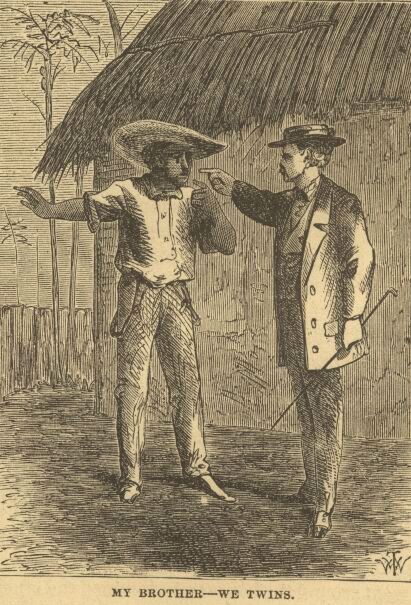 warranting him to be in excellent condition. Smith had a saddle and blanket of his own, and he ordered the Kanaka to put these on the horse. The Kanaka protested that he was perfectly willing to trust the gentleman with the saddle that was already on the animal, but Smith refused to use it. The change was made; then Smith noticed that the Kanaka had only changed the saddles, and had left the original blanket on the horse; he said he forgot to change the blankets, and so, |
to cut the bother short, Smith mounted and rode away. The horse went lame a mile from town, and afterward got to cutting up some extraordinary capers. Smith got down and took off the saddle, but the blanket stuck fast to the horse — glued to a procession of raw places. The Another friend of mine bought a pretty good horse from a native, a day or two ago, after a tolerably thorough examination of the animal. He discovered today that the horse was as blind as a bat, in one eye. He meant to have examined that eye, and came home with a general notion that he had done it; but he remembers now that every time he made the attempt his attention was called to something else by his victimizer. One more instance, and then I will pass to something else. I am informed that when a certain Mr. L., a visiting stranger, was here, he bought a pair of very respectable-looking match horses from a native. They were in a little stable with a partition through the middle of it — one horse in each apartment. Mr. L. examined one of them critically through a window (the Kanaka’s "brother" having gone to the country with the key), and then went around the house and examined the other through a window on the other side. He said it was the neatest match he had ever seen, and paid for the horses on the spot. Whereupon the Kanaka departed to join his brother in the country. The fellow had shamefully swindled L. There was only one "match" horse, and he had examined his starboard side through one window and his port side through another! I decline to believe this story, but I give it because it is worth something as a fanciful illustration of a fixed fact — namely, that the Kan- |
aka horse-jockey is fertile in invention and elastic in conscience. You can buy a pretty good horse for forty or fifty dollars, and a good enough horse for all practical purposes for two dollars and a half. I estimate "Oahu" to be worth somewhere in the neighborhood of thirty-five cents. A good deal better animal than he is was sold here day before yesterday for a dollar and seventy-five cents, and sold again to-day for two dollars and twenty-five cents; Williams bought a handsome and lively little pony yesterday for ten dollars; and about the best common horse on the island (and he is a really good one) sold yesterday, with Mexican saddle and bridle, for seventy dollars — a horse which is well and widely known, and greatly respected for his speed, good disposition 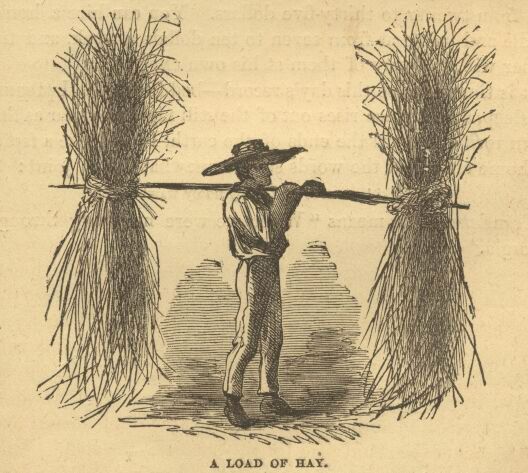 and everlasting bottom. You give your horse a little grain once a day; it comes from San Francisco, and is worth about two cents a pound; and you give him as much hay as he wants; it is cut and brought to the market by natives, and is not very good it is baled into long, round bundles, about the size of a large |
man; one of them is stuck by the middle on each end of a six foot pole, and the Kanaka shoulders the pole and walks about the streets between the upright bales in search of customers. These hay bales, thus carried, have a general resemblance to a colossal capital H. The hay-bundles cost twenty-five cents apiece, and one will last a horse about a day. You can get a horse for a song, a week’s hay for another song, and you can turn your animal loose among the luxuriant grass in your neighbor’s broad front yard without a song at all — you do it at midnight, and stable the beast again before morning. You have been at no expense thus far, but when you come to buy a saddle and bridle they will cost you from twenty to thirty-five dollars. You can hire a horse, saddle and bridle at from seven to ten dollars a week, and the owner will take care of them at his own expense. It is time to close this day’s record — bed time. As I prepare for sleep, a rich voice rises out of the still night, and, far as this ocean rock is toward the ends of the earth, I recognize a familiar home air. But the words seem somewhat out of joint: "Waikiki lantoni oe Kaa hooly hooly wawhoo."
Translated, that means "When we were marching through Georgia." 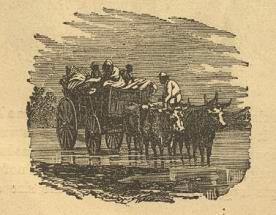 |
CHAPTER LXVI.Passing through the market place we saw that feature of Honolulu under its most favorable auspices — that is, in the full glory of Saturday afternoon, which is a festive day with the natives. The native girls by twos and threes and parties of a dozen, and sometimes in whole platoons and companies, went cantering up and down the neighboring streets astride of fleet but homely horses, and with their gaudy riding habits streaming like banners behind them. Such a troop of free and easy riders, in their natural home, the saddle, makes a gay and graceful spectacle. The riding habit I speak of is simply a long, broad scarf, like a tavern table cloth brilliantly colored, wrapped around the loins once, then apparently passed between the limbs and each end thrown backward over the same, and floating and flapping behind on both sides beyond the horse’s tail like a couple of fancy flags; then, slipping the stirrup-irons between her toes, the girl throws her chest forward, sits up like a Major General and goes sweeping by like the wind. The girls put on all the finery they can on Saturday afternoon — fine black silk robes; flowing red ones that nearly put your eyes out; others as white as snow; still others that discount the rainbow; and they wear their hair in nets, and trim their jaunty hats with fresh flowers, and encircle their dusky throats with home-made necklaces of the brilliant vermillion-tinted blossom of the ohia; and they fill the markets and the adjacent street with their bright presences, and smell like a rag factory on fire with their offensive cocoanut oil. |
Occasionally you see a heathen from the sunny isles away down in the South Seas, with his face and neck tatooed till he looks like the customary mendicant from Washoe who has been blown up in a mine. Some are tattooed a dead blue color down to the upper lip — masked, as it were — leaving the natural light yellow skin of Micronesia unstained from thence down; some with broad marks drawn down 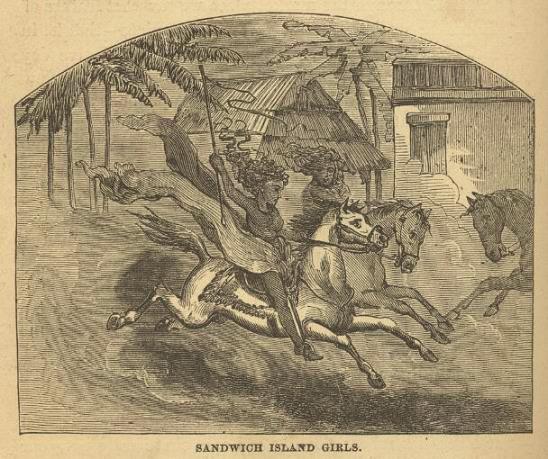 from hair to neck, on both sides of the face, and a strip of the original yellow skin, two inches wide, down the center — a gridiron with a spoke broken out; and some with the entire face discolored with the popular mortification tint, relieved only by one or two thin, wavy threads of natural yellow running across the face from ear to ear, and eyes twinkling out of this darkness, from under shadowing hat-brims, like stars in the dark of the moon. Moving among the stirring crowds, you come to the poi merchants, squatting in the shade on their hams, in true native fashion, and surrounded by purchasers. (The Sandwich Island- |
ers always squat on their hams, and who knows but they may be the old original "ham sandwiches?" The thought is pregnant with interest.) The poi looks like common flour paste, and is kept in large Around a small shanty was collected a crowd of natives buying the awa root. It is said that but for the use of this root the destruction of the people in former times by certain imported |
diseases would have been far greater than it was, and by others it is said that this is merely a fancy. All agree that poi will rejuvenate a man who is used up and his vitality almost annihilated by hard drinking, and that in some kinds of diseases it will restore health after all medicines have failed; but all are not willing to allow to the awa the virtues claimed for it. The natives manufacture an intoxicating drink from it which is fearful in its effects when persistently indulged in. It covers the body with dry, white scales, inflames the eyes, and causes premature decripitude. Although the man before whose establishment we stopped has to pay a Government license of eight hundred dollars a year for the exclusive right to sell awa root, it is said that he makes a small fortune every twelve-month; while saloon keepers, who pay a thousand dollars a year for the privilege of retailing whiskey, etc., only make a bare living. We found the fish market crowded; for the native is very fond of fish, and eats the article raw and alive! Let us change the subject. In old times here Saturday was a grand gala day indeed. All the native population of the town forsook their labors, and those of the surrounding country journeyed to the city. Then the white folks had to stay indoors, for every street was so packed with charging cavaliers and cavalieresses that it was next to impossible to thread one’s way through the cavalcades without getting crippled. At night they feasted and the girls danced the lascivious hula hula — a dance that is said to exhibit the very perfection of educated notion of limb and arm, hand, head and body, and the exactest uniformity of movement and accuracy of "time." It was performed by a circle of girls with no raiment on them to speak of, who went through an infinite variety of motions and figures without prompting, and yet so true was their "time," and in such perfect concert did they move that when they were placed in a straight line, hands, arms, bodies, limbs and heads waved, swayed, gesticulated, bowed, stooped, whirled, squirmed, twisted and undulated as if they were part and parcel of a single individual; and it was difficult to believe they were not moved in a body by some exquisite piece of mechanism. |
Of late years, however, Saturday has lost most of its quondam gala features. This weekly stampede of the natives interfered too much with labor and the interests of the white folks, and by sticking in a law here, and preaching a sermon there, and by various other means, they gradually broke it up. The demoralizing hula hula was forbidden to be performed, save at night, with closed doors, in presence of few spectators, and only by permission duly procured from the authorities and the payment of ten dollars for the same. There are few girls now-a-days able to dance this ancient national dance in the highest perfection of the art. The missionaries have christianized and educated all the natives. They all belong to the Church, and there is not one of them, above the age of eight years, but can read and write with facility in the native tongue. It is the most universally educated race of people outside of China. They have any quantity of books, printed in the Kanaka language, and all the natives are fond of reading. They are inveterate church-goers — nothing can keep them away. All this ameliorating cultivation has at last built up in the native women a profound respect for chastity — in other people. Perhaps that is enough to say on that head. The national sin will die out when the race does, but perhaps not earlier. — But doubtless this purifying is not far off, when we reflect that contact with civilization and the whites has reduced the native population from four hundred thousand (Captain Cook’s estimate,) to fifty-five thousand in something over eighty years! Society is a queer medley in this notable missionary, whaling and governmental centre. If you get into conversation with a stranger and experience that natural desire to know what sort of ground you are treading on by finding out what manner of man your stranger is, strike out boldly and address him as "Captain." Watch him narrowly, and if you see by his countenance that you are on the wrong tack, ask him where he preaches. It is a safe bet that he is either a missionary or captain of a whaler. I am now personally acquainted with seventy-two captains and ninety-six missionaries. |
The captains and ministers form one-half of the population; the third fourth is composed of common Kanakas and mercantile foreigners and their families, and the final fourth is made up of high officers of the Hawaiian Government. And there are just about cats enough for three apiece all around. A solemn stranger met me in the suburbs the other day, and said: "Good morning, your reverence. Preach in the stone church yonder, no doubt?" "No, I don’t. I’m not a preacher." "Really, I beg your pardon, Captain. I trust you had a good season. How much oil" — "Oil? What do you take me for? I’m not a whaler." "Oh, I beg a thousand pardons, your Excellency. Major General in the household troops, no doubt? Minister of the Interior, likely?  Secretary of war? First Gentleman of the Bed-chamber? Commissioner of the Royal" — "Stuff! I’m no official. I’m not connected in any way with the Government." |
"Bless my life! Then, who the mischief are you? what the mischief are you? and how the mischief did you get here, and where in thunder did you come from?" "I’m only a private personage — an unassuming stranger — lately arrived from America." "No? Not a missionary! Not a whaler! not a member of his Majesty’s Government! not even Secretary of the Navy! Ah, Heaven! it is too blissful to be true; alas, I do but dream. And yet that noble, honest countenance — those oblique, ingenuous eyes — that massive head, incapable of — of — anything; your hand; give me your hand, bright waif. Excuse these tears. For sixteen weary years I have yearned for a moment like this, and" — Here his feelings were too much for him, and he swooned away. I pitied this poor creature from the bottom of my heart. I was deeply moved. I shed a few tears on him and kissed him for his mother. I then took what small change he had and "shoved". 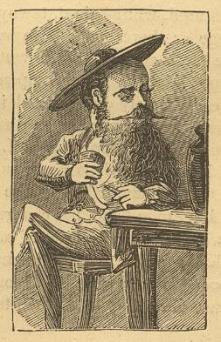 |
CHAPTER LXVII.I still quote from my journal: I found the national Legislature to consist of half a dozen white men and some thirty or forty natives. It was a dark assemblage. The nobles and Ministers (about a dozen of them altogether) occupied the extreme left of the hall, with David Kalakaua (the King’s Chamberlain) and Prince William at the head. The President of the Assembly, His Royal Highness M. Kekuanaoa,* [Kekuanaoa is not of the blood royal. He derives his princely rank from his wife, who was a daughter of Kamehameha the Great. Under other monarchies the male line takes precedence of the female in tracing genealogies, but here the opposite is the case — the female line takes precedence. Their reason for this is exceedingly sensible, and I recommend it to the aristocracy of Europe: They say it is easy to know who a man’s mother was, but, etc., etc.] and the Vice President (the latter a white man,) sat in the pulpit, if I may so term it. The President is the King’s father. He is an erect, strongly built, massive featured, white-haired, tawny old gentleman of eighty years of age or thereabouts. He was simply but well dressed, in a blue cloth coat and white vest, and white pantaloons, without spot, dust or blemish upon them. He bears himself with a calm, stately dignity, and is a man of noble presence. He was a young man and a distinguished warrior under that terrific fighter, Kamehameha I., more than half a century ago. A knowledge of his career suggested some such thought as this: "This man, naked as the day he was born, and war-club and spear in hand, has charged at the head of a horde of savages against other hordes of savages more than a generation and a half ago, and reveled in slaughter and carnage; has worshipped wooden images on his devout knees; has seen hundreds of his race offered up in heathen temples as sacrifices * Since dead. |
to wooden idols, at a time when no missionary’s foot had ever pressed this soil, and he had never heard of the white man’s God; has believed his enemy could secretly pray him to death; has seen the day, in his childhood, when it was a crime punishable by death for a man to eat with his wife, or for a plebeian to let his shadow fall upon the King — and now look at him; an educated Christian; neatly and handsomely dressed; a high-minded, elegant gentleman; a traveler, in some degree, and one who has been the honored guest of royalty in Europe; a man practiced in holding the reins of an enlightened government, and well versed in the politics of his country and in general, practical information. Look at him, sitting there presiding over the deliberations of a legislative body, among whom are white men — a grave, dignified, statesmanlike personage, and as seemingly natural and fitted to the place as if he had been born in it and had never been out of it in his life time. How the experiences of this old man’s eventful life shame the cheap inventions of romance!" Kekuanaoa is not of the blood royal. He derives his princely rank from his wife, who was a daughter of Kamehameha the Great. Under other monarchies the male line takes precedence of the female in tracing genealogies, but here the opposite is the case — the female line takes precedence. Their reason for this is exceedingly sensible, and I recommend it to the aristocracy of Europe: They say it is easy to know who a man's mother was, but, etc., etc. The christianizing of the natives has hardly even weakened some of their barbarian superstitions, much less destroyed them. I have just referred to one of these. It is still a popular belief that if your enemy can get hold of any article belonging to you he can get down on his knees over it and pray you to death. Therefore many a native gives up and dies merely because he imagines that some enemy is putting him through a course of damaging prayer. This praying an individual to death seems absurd enough at a first glance, but then when we call to mind |
some of the pulpit efforts of certain of our own ministers the thing looks plausible. In former times, among the Islanders, not only a plurality of wives was customary, but a plurality of husbands likewise. Some native women of noble rank had as many as six husbands. A woman thus supplied did not reside with all her husbands at once, In those days woman was rigidly taught to "know her place." Her place was to do all the work, take all the cuffs, provide all the food, and content herself with what was left after her lord had finished his dinner. She was not only forbidden, by ancient law, and under penalty of death, to eat with her husband or enter a canoe, but was debarred, under the same penalty, from eating bananas, pine-apples, oranges and other choice fruits at any time or in any place. She had to confine herself pretty strictly to "poi" and hard work. These poor ignorant heathen seem to have had a sort of groping idea of what came of woman eating fruit in the garden of Eden, and they did not choose to take any more chances. But the missionaries broke up this satisfactory arrangement of things. They liberated woman and made her the equal of man. The natives had a romantic fashion of burying some of their children alive when the family became larger than necessary. The missionaries interfered in this matter too, and stopped it. To this day the natives are able to lie down and die whenever they want to, whether there is anything the matter with |
them or not. If a Kanaka takes a notion to die, that is the end of him; nobody can persuade him to hold on; all the doctors in the world could not save him. A luxury which they enjoy more than anything else, is a large funeral. If a person wants to get rid of a troublesome native, it is only necessary to promise him a fine funeral and name the hour and he will be on hand to the minute — at least his remains will. All the natives are Christians, now, but many of them still desert to the Great Shark God for temporary succor in time of trouble. An irruption of the great volcano of Kilauea, or an earthquake, always brings a deal of latent loyalty to the Great Shark God to the surface. It is common report that the King, educated, cultivated and refined Christian gentleman as he undoubtedly is, still turns to the idols of his fathers for help when disaster threatens. A planter caught a shark, and one of his christianized natives testified his emancipation from the thrall of ancient superstition by assisting to dissect the shark after a fashion forbidden by his abandoned creed. But remorse shortly began to torture him. He grew moody and sought solitude; brooded over his sin, refused food, and finally said he must die and ought to die, for he had sinned against the Great Shark God and could never know peace any more. He was proof against persuasion and ridicule, and in the course of a day or two took to his bed and died, although he showed no symptom of disease. His young daughter followed his lead and suffered a like fate within the week. Superstition is ingrained in the native blood and bone and it is only natural that it should crop out in time of distress. Wherever one goes in the Islands, he will find small piles of stones by the wayside, covered with leafy offerings, placed there by the natives to appease evil spirits or honor local deities belonging to the mythology of former days. In the rural districts of any of the Islands, the traveler hourly comes upon parties of dusky maidens bathing in the streams or in the sea without any clothing on and exhibiting no very |
intemperate zeal in the matter of hiding their nakedness. When the missionaries first took up their residence in Honolulu, the native women would pay their families frequent friendly visits, day by day, not even clothed with a blush. It was found a hard matter to convince them that this was rather indelicate. Finally the missionaries provided them with long, loose calico robes, and that ended the difficulty — for the women would troop through the town, stark naked, with their robes folded under their arms, march 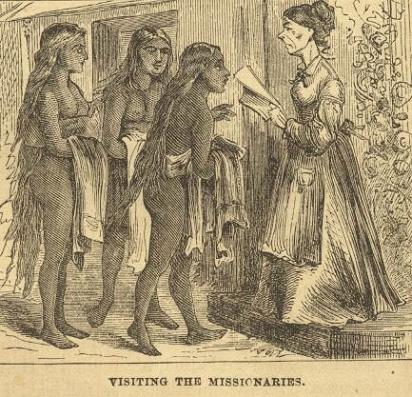 to the missionary houses and then proceed to dress! — The natives soon manifested a strong proclivity for clothing, but it was shortly apparent that they only wanted it for grandeur. The missionaries imported a quantity of hats, bonnets, and other male and female wearing apparel, instituted a general distribution, and begged the people not to come to church naked, next Sunday, as usual. And they did not; but the national spirit of unselfishness led them to divide up with neighbors who were not at the distribution, and next Sabbath the poor preachers could hardly keep countenance before their vast congregations. In the midst of the reading of |
a hymn a brown, stately dame would sweep up the aisle with a world of airs, with nothing in the world on but a "stovepipe" hat and a pair of cheap gloves; another dame would follow, tricked out in a man’s shirt, and nothing else; another one would enter with a flourish, with simply the sleeves of a bright calico dress tied around her waist and the rest of the garment dragging behind like a peacock’s tail off duty; a stately "buck" Kanaka would stalk in with a woman’s bonnet on, wrong side before — only this, and nothing more; after him would stride his fellow, with the legs of a pair of pantaloons tied around his neck, the rest of his person untrammeled; in his rear would come another gentleman simply gotten up in a fiery neck-tie and a striped vest. The poor creatures 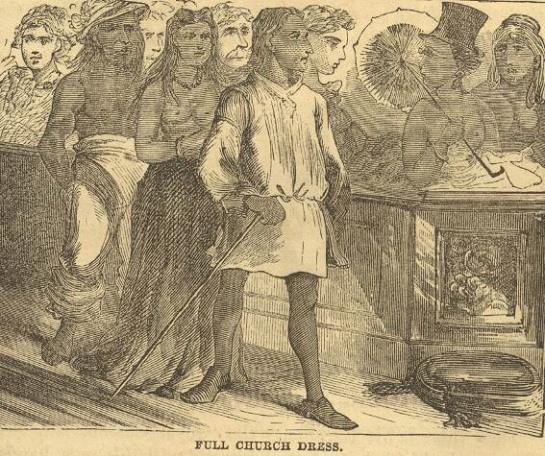 were beaming with complacency and wholly unconscious of any absurdity in their appearance. They gazed at each other with happy admiration, and it was plain to see that the young girls were taking note of what each other had on, as naturally as if they had always lived in a land of Bibles and knew what churches were made |
for; here was the evidence of a dawning civilization. The spectacle which the congregation presented was so extraordinary and withal so moving, that the missionaries found it difficult to keep to the text and go on with the services; and by and by when the simple children of the sun began a general swapping of garments in open meeting and produced some irresistibly grotesque effects in the course of re-dressing, there was nothing for it but to cut the thing short with the benediction and dismiss the fantastic assemblage. In our country, children play "keep house;" and in the same high-sounding but miniature way the grown folk here, with the poor little material of slender territory and meagre population, play "empire." There is his royal Majesty the King, with a New York detective’s income of thirty or thirty-five thousand dollars a year from the "royal civil list" and the "royal domain." He lives in a two-story frame "palace." And there is the "royal family" — the customary hive of royal Then there is his Excellency the "royal Chamberlain" — a sinecure, for his majesty dresses himself with his own hands, except when he is ruralizing at Waikiki and then he requires no dressing. Next we have his Excellency the Commander-in-chief of the * Missionary phrase. |
Household Troops, whose forces consist of about the number of soldiers usually placed under a corporal in other lands. Next comes the royal Steward and the Grand Equerry in Waiting — high dignitaries with modest salaries and little to do. Then we have his Excellency the First Gentleman of the Bed-chamber — an office as easy as it is magnificent. Next we come to his Excellency the Prime Minister, a renegade American from New Hampshire, all jaw, vanity, bombast and ignorance, a lawyer of "shyster" calibre, a fraud by nature, a humble worshipper of the sceptre above him, a reptile never tired of sneering at the land of his birth or glorifying the ten-acre kingdom that has adopted him — salary, $4,000 a year, vast consequence, and no perquisites. Then we have his Excellency the Imperial Minister of Finance, who handles a million dollars of public money a year, sends in his annual "budget" with great ceremony, talks prodigiously of "finance," suggests imposing schemes for paying off the "national debt" (of $150,000,) and does it all for $4,000 a year and unimaginable glory. Next we have his Excellency the Minister of War, who holds sway over the royal armies — they consist of two hundred and thirty uniformed Kanakas, mostly Brigadier Generals, and if the country ever gets into trouble with a foreign power we shall probably hear from them. I knew an American whose copper-plate visiting card bore this impressive legend: "Lieutenant-Colonel in the Royal Infantry." To say that he was proud of this distinction is stating it but tamely. The Minister of War has also in his charge some venerable swivels on Punch-Bowl Hill wherewith royal salutes are fired when foreign vessels of war enter the port. Next comes his Excellency the Minister of the Navy — a nabob who rules the "royal fleet," (a steam-tug and a sixty-ton schooner.) And next comes his Grace the Lord Bishop of Honolulu, the chief dignitary of the "Established Church" — for when the American Presbyterian missionaries had completed the |
reduction of the nation to a compact condition of Christianity, native royalty stepped in and erected the grand dignity of an "Established (Episcopal) Church" over it, and imported a cheap ready-made Bishop from England to take charge. The chagrin of the missionaries has never been comprehensively expressed, to this day, profanity not being admissible. Next comes his Excellency the Minister of Public Instruction. Next, their Excellencies the Governors of Oahu, Hawaii, etc., and after them a string of High Sheriffs and other small fry too numerous for computation. Then there are their Excellencies the Envoy Extraordinary and 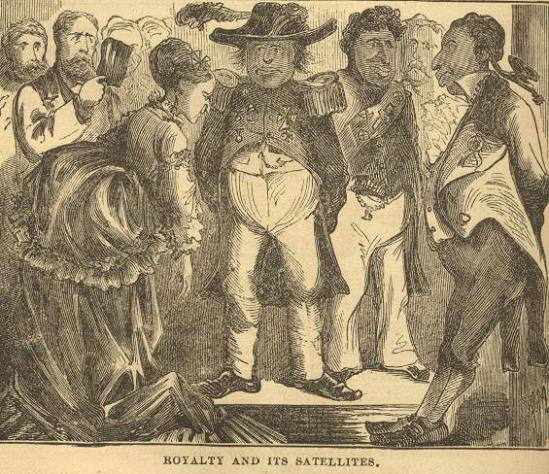 Minister Plenipotentiary of his Imperial Majesty the Emperor of the French; her British Majesty’s Minister; the Minister Resident, of the United States; and some six or eight representatives of other foreign nations, all with sounding titles, imposing dignity and prodigious but economical state. |
Imagine all this grandeur in a play-house "kingdom" whose population falls absolutely short of sixty thousand souls! The people are so accustomed to nine-jointed titles and colossal magnates that a foreign prince makes very little more stir in Honolulu than a Western Congressman does in New York. And let it be borne in mind that there is a strictly defined "court costume" of so "stunning" a nature that it would make the clown in a circus look tame and commonplace by comparison; and each Hawaiian official dignitary has a gorgeous vari-colored, gold-laced uniform peculiar to his office — no two of them are alike, and it is hard to tell which one is the "loudest." The King had a "drawing-room" at stated intervals, like other monarchs, and when these varied uniforms congregate there — weak-eyed people have to contemplate the spectacle through smoked glass. Is there not a gratifying contrast between this latter-day exhibition and the one the ancestors of some of these magnates afforded the missionaries the Sunday after the old-time distribution of clothing? Behold what religion and civilization have wrought! 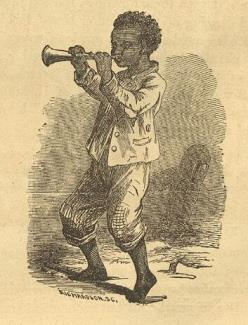 |
CHAPTER LXVIII.While I was in Honolulu I witnessed the ceremonious funeral of the King’s sister, her Royal Highness the Princess Victoria. According to the royal custom, the remains had lain in state at the palace thirty days, watched day and night by a guard of honor. And during all that time a great multitude of natives from the several islands had kept the palace grounds well crowded and had made the place a pandemonium every night with their howlings and wailings, beating of tom-toms and dancing of the (at other times) forbidden "hula-hula" by half-clad maidens to the music of songs of questionable decency chanted in honor of the deceased. The printed programme of the funeral procession interested me at the time; and after what I have just said of Hawaiian grandiloquence in the matter of "playing empire," I am persuaded that a perusal of it may interest the reader: After reading the long list of dignitaries, etc., and remembering the sparseness of the population, one is almost inclined to wonder where the material for that portion of the procession devoted to "Hawaiian Population Generally" is going to be procured:  |
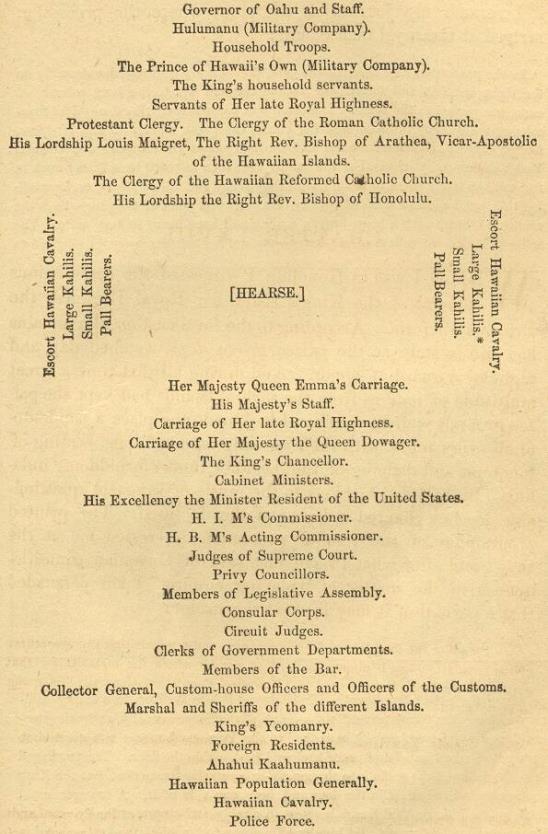 * Ranks of long-handled mops made of gaudy feathers — sacred to royalty. They are stuck in the ground around the tomb and left there. |
I resume my journal at the point where the procession arrived at the royal mausoleum: As the procession filed through the gate, the military deployed handsomely to the right and left and formed an avenue through which the long column of mourners passed to the tomb. The coffin was borne through the door of the mausoleum, followed by the King and his chiefs, the great officers of the kingdom, foreign Consuls, Embassadors and distinguished guests (Burlingame and General Van Valkenburgh). Several of the kahilis were then fastened to a frame-work in front of the tomb, there to remain until they decay and fall to pieces, or, forestalling this, until another scion of royalty dies. At this point of the proceedings the multitude set up such a heart-broken wailing as I hope never to hear again. The soldiers fired three volleys of musketry — the wailing being previously silenced 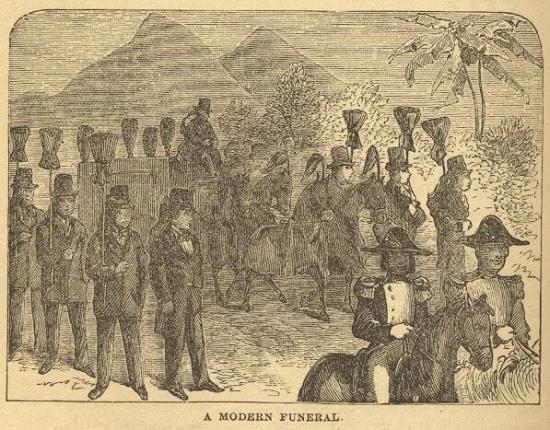 to permit of the guns being heard. His Highness Prince William, in a showy military uniform (the "true prince," this — scion of the house over-thrown by the present dynasty — he was formerly betrothed to the Princess but was not allowed to marry her), stood guard and paced back and forth within the door. The privileged few who followed the coffin into the mausoleum remained sometime, but the King soon came out and stood in the door and near one side of it. A stranger could have guessed his rank (although he was so simply and unpretentiously dressed) by the profound deference paid him by all persons in his vicinity; by seeing his high officers receive his quiet orders and suggestions with bowed and uncovered heads; and by observing how careful those persons who came out of the mauso- |
leum were to avoid "crowding" him (although there was room enough in the doorway for a wagon to pass, for that matter); how respectfully they edged out sideways, scraping their backs against the wall and always presenting a front view of their persons to his Majesty, and never putting their hats on until they were well out of the royal presence. He was dressed entirely in black — dress-coat and silk hat — and looked rather democratic in the midst of the showy uniforms about him. On his breast he wore a large gold star, which was half hidden by the lapel of his coat. He remained at the door a half hour, and occasionally gave an order to the men who were erecting the kahilis [Ranks of long-handled mops made of gaudy feathers — sacred to royalty. They are stuck in the ground around the tomb and left there.] before the tomb. He had the good taste to make one of them substitute black crape for the ordinary hempen rope he was about to tie one of them to the frame-work with. Finally he entered his carriage and drove away, and the populace shortly began to drop into his wake. While he was in view there was but one man who attracted more attention than himself, and that was Harris (the Yankee Prime Minister). This feeble personage had crape enough around his hat to express the grief of an entire nation, and as usual he neglected no opportunity of making himself conspicuous and exciting the admiration of the simple Kanakas. Oh! noble ambition of this modern Richelieu! It is interesting to contrast the funeral ceremonies of the Princess Victoria with those of her noted ancestor Kamehameha the Conqueror, who died fifty years ago — in 1819, the year before the first missionaries came. "On the 8th of May, 1819, at the age of sixty-six, he died, as he had lived, in the faith of his country. It was his misfortune not to have come in contact with men who could have rightly influenced his religious aspirations. Judged by his advantages and compared with the most eminent of his countrymen he may be justly styled not only great, but good. To this day his memory warms the heart and elevates the national feelings of Hawaiians. They are proud of their old warrior King; they love his name; his deeds form their historical age; and an enthusiasm everywhere prevails, shared even by foreigners who knew his worth, that constitutes the firmest pillar of the throne of his dynasty. "In lieu of human victims (the custom of that age), a sacrifice of three hundred dogs attended his obsequies — no mean holocaust when their national value and the estimation in which they were held are considered. The bones of Kamehameha, after being kept for a while, were so carefully concealed that all knowledge of their final resting place is now lost. There was a proverb current among the common people that the bones of a cruel King could not be hid; they made fish-hooks and arrows of them, upon which, in using them, they vented their abhorrence of his memory in bitter execrations." The account of the circumstances of his death, as written by the native historians, is full of minute detail, but there is scarcely a line of it which does not mention or illustrate some |
by-gone custom of the country. In this respect it is the most comprehensive document I have yet met with. I will quote it entire: "When Kamehameha was dangerously sick, and the priests were unable to cure him, they said: ‘Be of good courage and build a house for the god’ (his own private god or idol), that thou mayest recover.’ The chiefs corroborated this advice of the priests, and a place of worship was prepared for Kukailimoku, and consecrated in the evening. They proposed also to the King, with a view to prolong his life, that human victims should be sacrificed to his deity; upon which the greater part of the people absconded through fear of death, and concealed themselves in hiding places till the tabu [Tabu (pronounced tah-boo,) means prohibition (we have borrowed it,) or sacred. The tabu was sometimes permanent, sometimes temporary; and the person or thing placed under tabu was for the time being sacred to the purpose for which it was set apart. In the above case the victims selected under the tabu would be sacred to the sacrifice] in which destruction impended, was past. It is doubtful whether Kamehameha approved of the plan of the chiefs and priests to sacrifice men, as he was known to say, ‘The men are sacred for the King;’ meaning that they were for the service of his successor. This information was derived from Liholiho, his son. "After this, his sickness increased to such a degree that he had not strength to turn himself in his bed. When another season, consecrated for worship at the new temple (heiau) arrived, he said to his son, Liholiho, ‘Go thou and make supplication to thy god; I am not able to go, and will offer my prayers at home.’ When his devotions to his feathered god, Kukailimoku, were concluded, a certain religiously disposed individual, who had a bird god, suggested to the King that through its influence his sickness might be removed. The name of this god was Pua; its body was made of a bird, now eaten by the Hawaiians, and called in their language alae. Kamehameha was willing that a trial should be made, and two houses were constructed to facilitate the experiment; but while dwelling in them he became so very weak as not to receive food. After lying there three days, his wives, children and chiefs, perceiving that he was very low, returned him to his own house. In the evening he was carried to the eating house, where he took a little food in his mouth which he did not swallow; also a cup of water. The chiefs requested him to give them his counsel; but he made no reply, and was carried back to the dwelling house; but when near midnight — ten o’clock, perhaps — he was carried again to the place to eat; but, as before, he merely tasted of what was presented to him. Then Kaikioewa addressed him thus: ‘Here we all are, your younger brethren, your son Liholiho and your foreigner; impart to us your dying charge, that Liholiho and Kaahumanu may hear.’ Then Kamehameha inquired, ‘What do you say?’ Kaikioewa repeated, ‘Your counsels for us.’ * Tabu (pronounced tah-boo,) means prohibition (we have borrowed it,) or sacred. The tabu was sometimes permanent, sometimes temporary; and the person or thing placed under tabu was for the time being sacred to the purpose for which it was set apart. In the above case the victims selected under the tabu would be sacred to the sacrifice. |
"He then said, ‘Move on in my good way and — .’ He could proceed no further. The foreigner, Mr. Young, embraced and kissed him. Hoapili also embraced him, whispering something in his ear, after which he was taken back to the house. About twelve he was carried once more to the house for eating, into which his head entered, while his body was in the dwelling house immediately adjoining. It should be remarked that this frequent carrying of a sick chief from one house to another resulted from the tabu system, then in force. There were at that time six houses (huts) connected with an establishment — one was for worship, one for the men to eat in, an eating house for the women, a house to sleep in, a house in which to manufacture kapa (native cloth) and one where, at certain intervals, the women might dwell in seclusion. "The sick was once more taken to his house, when he expired; this was at two o’clock, a circumstance from which Leleiohoku derived his name. As he breathed his last, Kalaimoku came to the eating house to order those in it to go out. There were two aged persons thus directed to depart; one went, the other remained on account of love to the King, by whom he had formerly been kindly sustained. The children also were sent away. Then Kalaimoku came to the house, and the chiefs had a consultation. One of them spoke thus: ‘This is my thought — we will eat him raw. [This sounds suspicious, in view of the fact that all Sandwich Island historians, white and black, protest that cannibalism never existed in the islands. However, since they only proposed to "eat him raw" we "won’t count that". But it would certainly have been cannibalism if they had cooked him. — M. T.] Kaahumanu (one of the dead King’s widows) replied, ‘Perhaps his body is not at our disposal; that is more properly with his successor. Our part in him — his breath — has departed; his remains will be disposed of by Liholiho. "After this conversation the body was taken into the consecrated house for the performance of the proper rites by the priest and the new King. The name of this ceremony is uko; and when the sacred hog was baked the priest offered it to the dead body, and it became a god, the King at the same time repeating the customary prayers. Then the priest, addressing himself to the King and chiefs, said: ‘I will now make known to you the rules to be observed respecting persons to be sacrificed on the burial of this body. If you obtain one man before the corpse is removed, one will be sufficient; but after it leaves this house four will be required. If delayed until we carry the corpse to the grave there must be ten; but after it is deposited in the grave there must be fifteen. To-morrow morning there will be a tabu, and, if the sacrifice be delayed until that time, forty men must die.’ "Then the high priest, Hewahewa, inquired of the chiefs, ‘Where shall be the residence of King Liholiho?’ They replied, ‘Where, indeed? You, of all men, ought to know.’ Then the priest observed, ‘There are two suitable places; one is Kau, the other is Kohala.’ The chiefs preferred the latter, as it was more thickly inhabited. The priest added, ‘These are proper places for the King’s residence; but he must not remain in Kona, for it is polluted.’ This was agreed to. It was now break of day. As he was being carried to the place of burial the peo- * This sounds suspicious, in view of the fact that all Sandwich Island historians, white and black, protest that cannibalism never existed in the islands. However, since they only proposed to "eat him raw" we "won't count that". But it would certainly have been cannibalism if they had cooked him. — [M. T.] |
ple perceived that their King was dead, and they wailed. When the corpse was removed from the house to the tomb, a distance of one chain, the procession was met by a certain man who was ardently attached to the deceased. He leaped upon the chiefs who were carrying the King’s body; he desired to die with him on account of his love. The chiefs drove him away. He persisted in making numerous attempts, which were unavailing. Kalaimoka also had it in his heart to die with him, but was prevented by Hookio. "The morning following Kamehameha’s death, Liholiho and his train departed for Kohala, according to the suggestions of the priest, to avoid the defilement occasioned by the dead. At this time if a chief died the land was polluted, and the heirs sought a residence in another part of the country until the corpse was dissected and the bones tied in a bundle, which being done, the season of defilement terminated. If the deceased were not a chief, the house only was defiled which became pure again on the burial of the body. Such were the laws on this subject. "On the morning on which Liholiho sailed in his canoe for Kohala, the chiefs and people mourned after their manner on occasion of a chief’s death, conducting themselves like madmen and like beasts. Their conduct was such as to forbid description; The priests, also, put into action the sorcery apparatus, that the person who had prayed the King to death might die; for it was not believed that Kamehameha’s departure was the effect either of sickness or old age. When the sorcerers set up by their fire-places stick with a strip of kapa flying at the top, the chief Keeaumoku, Kaahumaun’s brother, came in a state of intoxication and broke the flag-staff of the sorcerers, from which it was inferred that Kaahumanu and her friends had been instrumental in the King’s death. On this account they were subjected to abuse." You have the contrast, now, and a strange one it is. This great Queen, Kaahumanu, who was "subjected to abuse" during the frightful orgies that followed the King’s death, in accordance with ancient custom, afterward became a devout Christian and a steadfast and powerful friend of the missionaries. Dogs were, and still are, reared and fattened for food, by the natives — hence the reference to their value in one of the above paragraphs. Forty years ago it was the custom in the Islands to suspend all law for a certain number of days after the death of a royal personage; and then a saturnalia ensued which one may picture to himself after a fashion, but not in the full horror of the reality. The people shaved their heads, knocked out a tooth or two, plucked out an eye sometimes, cut, bruised, mutilated or |
burned their flesh, got drunk, burned each other’s huts, maimed or murdered one another according to the caprice of the moment, and both sexes gave themselves up to brutal and unbridled licentiousness. And after it all, came a torpor from 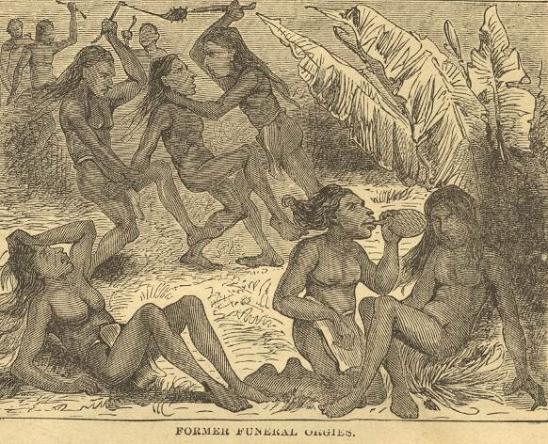 which the nation slowly emerged bewildered and dazed, as if from a hideous half-remembered nightmare. They were not the salt of the earth, those "gentle children of the sun." The natives still keep up an old custom of theirs which cannot be comforting to an invalid. When they think a sick friend is going to die, a couple of dozen neighbors surround his hut and keep up a deafening wailing night and day till he either dies or gets well. No doubt this arrangement has helped many a subject to a shroud before his appointed time. They surround a hut and wail in the same heart-broken way when its occupant returns from a journey. This is their dismal idea of a welcome. A very little of it would go a great way with most of us. |
CHAPTER LXIX.Bound for Hawaii (a hundred and fifty miles distant,) to visit the great volcano and behold the other notable things which distinguish that island above the remainder of the group, we sailed from Honolulu on a certain Saturday afternoon, in the good schooner Boomerang. The Boomerang was about as long as two street cars, and about as wide as one. She was so small (though she was larger than the majority of the inter-island coasters) that when I stood on her deck I felt but little smaller than the Colossus of Rhodes must have felt when he had a man-of- war under him. I could reach the water when she lay over under a strong breeze. When the Captain and my comrade (a Mr. Billings), myself and four other persons were all assembled on the little after portion of the deck which is sacred to the cabin passengers, it was full — there was not room for any more quality folks. Another section of the deck, twice as large as ours, was full of natives of both sexes, with their customary dogs, mats, blankets, pipes, calabashes of poi, fleas, and other luxuries and baggage of minor importance. As soon as we set sail the natives all lay down on the deck as thick as negroes in a slave-pen, and smoked, conversed, and spit on each other, and were truly sociable. The little low-ceiled cabin below was rather larger than a hearse, and as dark as a vault. It had two coffins on each side — I mean two bunks. A small table, capable of accommodating
|
three persons at dinner, stood against the forward bulkhead, and over it hung the dingiest whale oil lantern that ever peopled the obscurity of a dungeon with ghostly shapes. The floor room unoccupied was not extensive. One might swing a cat in it, perhaps, but not a long cat. The hold forward of the bulkhead had but little freight in it, and from morning till Sleeping was out of the question when he was on watch. He was a source of genuine aggravation and annoyance. It was worse than useless to shout at him or apply offensive epithets to him — he only took these things for applause, and strained himself to make more noise. Occasionally, during the day, I threw potatoes at him through an aperture in the bulkhead, but he only dodged and went on crowing. The first night, as I lay in my coffin, idly watching the dim lamp swinging to the rolling of the ship, and snuffing the nauseous odors of bilge water, I felt something gallop over me. I turned out promptly. However, I turned in again when I found it was only a rat. Presently something galloped over me once more. I knew it was not a rat this time, and I thought it might be a centipede, because the Captain had killed one on deck in the afternoon. I turned out. The first glance at the pillow showed me repulsive sentinel perched upon each |
end of it — cockroaches as large as peach leaves — fellows with long, quivering antennae and fiery, malignant eyes. They were grating their teeth like tobacco worms, and appeared to be dissatisfied about something. I had often heard that these reptiles were in the habit of eating off sleeping sailors’ toe nails down to the quick, and I would not get in the bunk any more. I lay down on the floor. But a rat came and bothered me, and shortly afterward a procession of cockroaches arrived and camped in my hair. In a few moments the rooster was crowing with uncommon spirit and a party of fleas were throwing double somersaults about my person in the wildest disorder, and taking a bite every time they struck. I was beginning to feel really annoyed. I got up and put my clothes on and went on deck. The above is not overdrawn; it is a truthful sketch of inter-island schooner life. There is no such thing as keeping a vessel in elegant condition, when she carries molasses and Kanakas. It was compensation for my sufferings to come unexpectedly upon so beautiful a scene as met my eye — to step suddenly out of the sepulchral gloom of the cabin and stand under the strong light of the moon — in the centre, as it were, of a glittering sea of liquid silver — to see the broad sails straining in the gale, the ship heeled over on her side, the angry foam hissing past her lee bulwarks, and sparkling sheets of spray dashing high over her bows and raining upon her decks; to brace myself and hang fast to the first object that presented itself, with hat jammed down and coat tails whipping in the breeze, and feel that exhilaration that thrills in one’s hair and quivers down his back bone when he knows that every inch of canvas is drawing and the vessel cleaving through the waves at her utmost speed. There was no darkness, no dimness, no obscurity there. All was brightness, every object was vividly defined. Every prostrate Kanaka; every coil of rope; every calabash of poi; every puppy; every seam in the flooring; every bolthead; every object; however minute, showed sharp and distinct in its every outline; and the shadow of the broad mainsail lay black |
as a pall upon the deck, leaving Billings’s white upturned face glorified and his body in a total eclipse. Monday morning we were close to the island of Hawaii. Two of its high mountains were in view — Mauna Loa and Hualaiai. The latter is an imposing peak, but being only ten 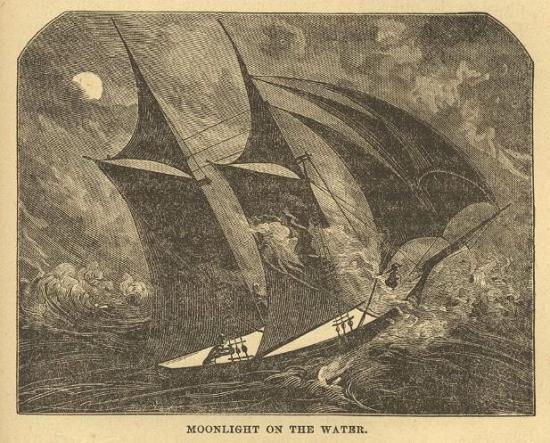 thousand feet high is seldom mentioned or heard of. Mauna Loa is said to be sixteen thousand feet high. The rays of glittering snow and ice, that clasped its summit like a claw, looked refreshing when viewed from the blistering climate we were in. One could stand on that mountain (wrapped up in blankets and furs to keep warm), and while he nibbled a snowball or an icicle to quench his thirst he could look down the long sweep of its sides and see spots where plants are growing that grow only where the bitter cold of Winter prevails; lower down he could see sections devoted to production that thrive in the temperate zone alone; and at the bottom of the mount- |
ain he could see the home of the tufted cocoa-palms and other species of vegetation that grow only in the sultry atmosphere of eternal Summer. He could see all the climes of the world at a single glance of the eye, and that glance would only pass over a distance of four or five miles as the bird flies! By and by we took boat and went ashore at Kailua, designing to ride horseback through the pleasant orange and coffee region of Kona, and rejoin the vessel at a point some leagues distant. This journey is well worth taking. The trail passes along on high ground — say a thousand feet above sea level — and usually about a mile distant from the ocean, which is always in sight, save that occasionally you find yourself buried in the forest in the midst of a rank tropical vegetation and a dense growth of trees, whose great bows overarch the road and shut out sun and sea and everything, and leave you in a dim, shady tunnel, haunted with invisible singing birds and fragrant with the odor of flowers. It was pleasant to ride occasionally in the warm sun, and feast the eye upon the ever-changing panorama of the forest (beyond and below us), with its many tints, its softened lights and shadows, its billowy undulations sweeping gently down from the mountain to the sea. It was pleasant also, at intervals, to leave the sultry sun and pass into the cool, green depths of this forest and indulge in sentimental reflections under the inspiration of its brooding twilight and its whispering foliage. We rode through one orange grove that had ten thousand trees in it! They were all laden with fruit. At one farmhouse we got some large peaches of excellent flavor. This fruit, as a general thing, does not do well in the Sandwich Islands. It takes a sort of almond shape, and is small and bitter. It needs frost, they say, and perhaps it does; if this be so, it will have a good opportunity to go on needing it, as it will not be likely to get it. The trees from which the fine fruit I have spoken of, came, had been planted and replanted sixteen times, and to this treatment the proprietor of the orchard attributed his success. |
We passed several sugar plantations — new ones and not very extensive. The crops were, in most cases, third rattoons. [NOTE. — The first crop is called "plant cane;" subsequent crops which spring from the original roots, without replanting, are called "rattoons."] Almost everywhere on the island of Hawaii sugar-cane matures in twelve months, both rattoons and plant, and although it ought to be taken off as soon as it tassels, no doubt, it is not absolutely necessary to do it until about four months afterward. In Kona, the average yield of an acre of ground is two tons of sugar, they say. This is only a moderate yield for these islands, but would be astounding for Louisiana and most other sugar growing countries. The plantations in Kona being on pretty high ground — up among the light and frequent rains — no irrigation whatever is required. 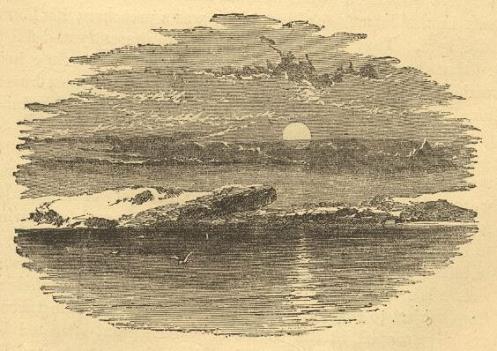 |
CHAPTER LXX.We stopped some time at one of the plantations, to rest ourselves and refresh the horses. We had a chatty conversation with several gentlemen present; but there was one person, a middle aged man, with an absent look in his face, who simply glanced up, gave us good-day and lapsed again into the meditations which our coming had interrupted. The planters whispered us not to mind him — crazy. They said he was in the Islands for his health; was a preacher; his home, Michigan. They said that if he woke up presently and fell to talking about a correspondence which he had some time held with Mr. Greeley about a trifle of some kind, we must humor him and listen with interest; and we must humor his fancy that this correspondence was the talk of the world. It was easy to see that he was a gentle creature and that his madness had nothing vicious in it. He looked pale, and a little worn, as if with perplexing thought and anxiety of mind. He sat a long time, looking at the floor, and at intervals muttering to himself and nodding his head acquiescingly or shaking it in mild protest. He was lost in his thought, or in his memories. We continued our talk with the planters, branching from subject to subject. But at last the word "circumstance," casually dropped, in the course of conversation, attracted his attention and brought an eager look into his countenance. He faced about in his chair and said: "Circumstance? What circumstance? Ah, I know — I |
know too well. So you have heard of it too." [With a sigh.] "Well, no matter — all the world has heard of it. All the world. The whole world. It is a large world, too, for a thing to travel so far in — now isn’t it? Yes, yes — the Greeley correspondence with Erickson has created the saddest and bitterest controversy on both sides of the ocean — and still they keep it up! It makes us famous, but at what a sorrowful sacrifice! I was so sorry when I heard that it had caused that bloody and distressful war over there in Italy. It was little comfort to me, after so much bloodshed, to know that the victors sided with me, and the vanquished with Greeley. — It is little comfort to know that Horace Greeley is responsible for the battle of Sadowa, and not me. Queen Victoria wrote 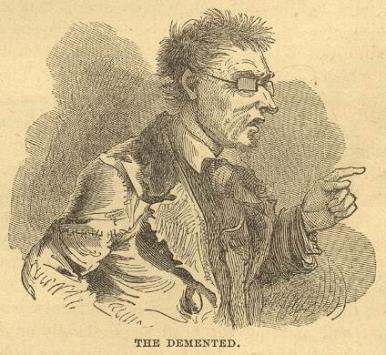 me that she felt just as I did about it — she said that as much as she was opposed to Greeley and the spirit he showed in the correspondence with me, she would not have had Sadowa happen for hundreds of dollars. I can show you her letter, if you would like to see it. But gentlemen, much as you may think you know about that unhappy correspondence, you cannot know the straight of it till you hear it from my lips. It has always been garbled in |
the journals, and even in history. Yes, even in history — think of it! Let me — please let me, give you the matter, exactly as it occurred. I truly will not abuse your confidence." Then he leaned forward, all interest, all earnestness, and told his story — and told it appealingly, too, and yet in the simplest and most unpretentious way; indeed, in such a way as to suggest to one, all the time, that this was a faithful, honorable witness, giving evidence in the sacred interest of justice, and under oath. He said: "Mrs. Beazeley — Mrs. Jackson Beazeley, widow, of the village of Campbellton, Kansas, — wrote me about a matter which was near her heart — a matter which many might think trivial, but to her it was a thing of deep concern. I was living in Michigan, then — serving in the ministry. She was, and is, an estimable woman — a woman to whom poverty and hardship have proven incentives to industry, in place of discouragements. Her only treasure was her son William, a youth just verging upon manhood; religious, amiable, and sincerely attached to agriculture. He was the widow’s comfort and her pride. And so, moved by her love for him, she wrote me about a matter, as I have said before, which lay near her heart — because it lay near her boy’s. She desired me to confer with Mr. Greeley about turnips. Turnips were the dream of her child’s young ambition. While other youths were frittering away in frivolous amusements the precious years of budding vigor which God had given them for useful preparation, this boy was patiently enriching his mind with information concerning turnips. The sentiment which he felt toward the turnip was akin to adoration. He could not think of the turnip without emotion; he could not speak of it calmly; he could not contemplate it without exaltation. He could not eat it without shedding tears. All the poetry in his sensitive nature was in sympathy with the gracious vegetable. With the earliest pipe of dawn he sought his patch, and when the curtaining night drove him from it he shut himself up with his books and garnered statistics till sleep overcame him. On rainy days he sat and talked |
hours together with his mother about turnips. When company came, he made it his loving duty to put aside everything else and converse with them all the day long of his great joy in 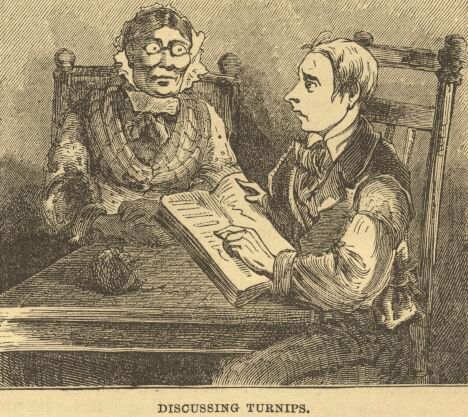 the turnip. "And yet, was this joy rounded and complete? Was there no secret alloy of unhappiness in it? Alas, there was. There was a canker gnawing at his heart; the noblest inspiration of his soul eluded his endeavor — viz: he could not make of the turnip a climbing vine. Months went by; the bloom forsook his cheek, the fire faded out of his eye; sighings and abstraction usurped the place of smiles and cheerful converse. But a watchful eye noted these things and in time a motherly sympathy unsealed the secret. Hence the letter to me. She pleaded for attention — she said her boy was dying by inches. "I was a stranger to Mr. Greeley, but what of that? The matter was urgent. I wrote and begged him to solve the difficult problem if possible and save the student’s life. My interest grew, until it partook of the anxiety of the mother. I waited in much suspense. — At last the answer came. |
"I found that I could not read it readily, the handwriting being unfamiliar and my emotions somewhat wrought up. It seemed to refer in part to the boy’s case, but chiefly to other and irrelevant matters — such as paving-stones, electricity, oysters, and something which I took to be ‘absolution’ or ‘agrarianism,’ I could not be certain which; still, these appeared to be simply casual mentions, nothing more; friendly in spirit, without doubt, but lacking the connection or coherence necessary to make them useful. — I judged that my understanding was affected by my feelings, and so laid the letter away till morning. "In the morning I read it again, but with difficulty and uncertainty still, for I had lost some little rest and my mental vision seemed clouded. The note was more connected, now, but did not meet the emergency it was expected to meet. It was too discursive. It appeared to read as follows, though I was not certain of some of the words:
"But there did not seem to be a word about turnips. There seemed to be no suggestion as to how they might be made to grow like vines. There was not even a reference to the Beazeleys. I slept upon the matter; I ate no supper, neither any breakfast next morning. So I resumed my work with a brain refreshed, and was very hopeful. Now the letter took a different aspect — all save the signature, which latter I judged to be only a harmless affectation of Hebrew. The epistle was necessarily from Mr. Greeley, for it bore the printed heading of The Tribune, and I had written to no one else there. The letter, I say, had taken a different aspect, but still its language was eccentric and avoided the issue. It now appeared to say: 'Bolivia extemporizes mackerel; borax esteems polygamy; sausages wither in the east. Creation perdu, is done; for woes inherent one can damn. Buttons, buttons, corks, geology underrates but we shall allay. My beer’s out. Yrxwly, Hevace Eveeloj.’
|
 "I was evidently overworked. My comprehension was impaired. Therefore I gave two days to recreation, and then returned to my task greatly refreshed. The letter now took this form: "Poultices do sometimes choke swine; tulips reduce posterity; causes leather to resist. Our notions empower wisdom, her let’s afford while we can. Butter but any cakes, fill any undertaker, we’ll wean him from his filly. We feel hot. Yrxwly, Hevace Eveeloj.’
|
"I was still not satisfied. These generalities did not meet the question. They were crisp, and vigorous, and delivered with a confidence that almost compelled conviction; but at such a time as this, with a human life at stake, they seemed inappropriate, worldly, and in bad taste. At any other time I would have been not only glad, but proud, to receive from a man like Mr. Greeley a letter of this kind, and would have studied it earnestly and tried to improve myself all I could; but now, with that poor boy in his far home languishing for relief, I had no heart for learning. "Three days passed by, and I read the note again. Again its tenor had changed. It now appeared to say:
"This was more like it. But I was unable to proceed. I was too much worn. The word ‘turnips’ brought temporary joy and encouragement, but my strength was so much impaired, and the delay might be so perilous for the boy, that I relinquished the idea of pursuing the translation further, and resolved to do what I ought to have done at first. I sat down and wrote Mr. Greeley as follows:
|
him. Therefore, no amount of ‘dirt, bathing,’ etc., etc., howsoever ‘unfairly followed’ will be likely to ‘worm him from his folly’ — if being dead and a ghost is ‘folly.’ Your closing remark is as unkind as it was uncalled for; and if report says true you might have applied it to yourself, sir, with more point and less impropriety. Very Truly Yours, SIMON ERICKSON. "In the course of a few days, Mr. Greely did what would have saved a world of trouble, and much mental and bodily suffering and misunderstanding, if he had done it sooner. To wit, he sent an intelligible rescript or translation of his original note, made in a plain hand by his clerk. Then the mystery cleared, and I saw that his heart had been right, all the time. I will recite the note in its clarified form: [Translation.]
‘Potatoes do sometimes make vines; turnips remain passive: cause unnecessary to state. Inform the poor widow her lad’s efforts will be vain. But diet, bathing, etc. etc., followed uniformly, will wean him from his folly — so fear not. Yours, Horace Greeley.’
"But alas, it was too late, gentlemen — too late. The criminal delay had done its work — young Beazely was no more. His spirit had taken its flight to a land where all anxieties shall be charmed away, all desires gratified, all ambitions realized. Poor lad, they laid him to his rest with a turnip in each hand." So ended Erickson, and lapsed again into nodding, mumbling, and abstraction. The company broke up, and left him so.... But they did not say what drove him crazy. In the momentary confusion, I forgot to ask. |
CHAPTER LXXI.At four o’clock in the afternoon we were winding down a mountain of dreary and desolate lava to the sea, and closing our pleasant land journey. This lava is the accumulation of ages; one torrent of fire after another has rolled down here in old times, and built up the island structure higher and higher. Underneath, it is honey-combed with caves; it would be of no use to dig wells in such a place; they would not hold water — you would not find any for them to hold, for that matter. Consequently, the planters depend upon cisterns. The last lava flow occurred here so long ago that there are none now living who witnessed it. In one place it enclosed and burned down a grove of cocoa-nut trees, and the holes in the lava where the trunks stood are still visible; their sides retain the impression of the bark; the trees fell upon the burning river, and becoming partly submerged, left in it the perfect counterpart of every knot and branch and leaf, and even nut, for curiosity seekers of a long distant day to gaze upon and wonder at. There were doubtless plenty of Kanaka sentinels on guard hereabouts at that time, but they did not leave casts of their figures in the lava as the Roman sentinels at Herculaneum and Pompeii did. It is a pity it is so, because such things are so interesting; but so it is. They probably went away. They went away early, perhaps. However, they had their merits; the Romans exhibited the higher pluck, but the Kanakas showed the sounder judgment. |
Shortly we came in sight of that spot whose history is so familiar to every school-boy in the wide world — Kealakekua Bay — the place where Captain Cook, the great circumnavigator, was killed by the natives, nearly a hundred years ago. The setting sun was flaming upon it, a Summer shower was falling, and it was spanned by two magnificent rainbows. Two men who were in advance of us rode through one of these and for a moment their garments shone with a more than regal splendor. Why did not Captain Cook have taste enough to call his great discovery the Rainbow Islands? These charming spectacles are present to you at every turn; they are common in all the islands; they are visible every day, and frequently at night also — not the silvery bow we see once in an age in the States, by moonlight, but barred with all bright and beautiful colors, like the children of the sun and rain. I saw one of them a few nights ago. What the sailors call "raindogs" — little patches of rainbow — are often seen drifting about the heavens in these latitudes, like stained cathedral windows. Kealakekua Bay is a little curve like the last kink of a snail-shell, winding deep into the land, seemingly not more than a mile wide from shore to shore. It is bounded on one side — where the murder was done — by a little flat plain, on which stands a cocoanut grove and some ruined houses; a steep wall of lava, a thousand feet high at the upper end and three or four hundred at the lower, comes down from the mountain and bounds the inner extremity of it. From this wall the place takes its name, Kealakekua, which in the native tongue signifies "The Pathway of the Gods." They say, (and still believe, in spite of their liberal education in Christianity), that the great god Lono, who used to live upon the hillside, always traveled that causeway when urgent business connected with heavenly affairs called him down to the seashore in a hurry.As the red sun looked across the placid ocean through the tall, clean stems of the cocoanut trees, like a blooming whiskey bloat through the bars of a city prison, I went and stood in the edge of the water on the flat rock pressed by Captain |
Cook’s feet when the blow was dealt which took away his life, and tried to picture in my mind the doomed man struggling in the midst of the multitude of exasperated 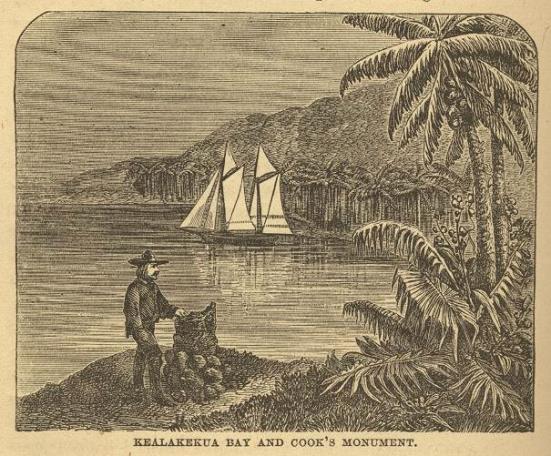 savages — the men in the ship crowding to the vessel’s side and gazing in anxious dismay toward the shore — the — but I discovered that I could not do it. It was growing dark, the rain began to fall, we could see that the distant Boomerang was helplessly becalmed at sea, and so I adjourned to the cheerless little box of a warehouse and sat down to smoke and think, and wish the ship would make the land — for we had not eaten much for ten hours and were viciously hungry. Plain unvarnished history takes the romance out of Captain Cook’s assassination, and renders a deliberate verdict of justifiable homicide. Wherever he went among the islands, he was cordially received and welcomed by the inhabitants, and his |
ships lavishly supplied with all manner of food. He returned these kindnesses with insult and ill-treatment. Perceiving that the people took him for the long vanished and lamented god Lono, he encouraged them in the delusion for the sake of the limitless power it gave him; but during the famous disturbance at this spot, and while he and his comrades were surrounded by fifteen thousand maddened savages, he received a hurt and betrayed his earthly origin with a groan. It was his death-warrant. Instantly a shout went up: "He groans! — he is not a god!" So they closed in upon him and dispatched him. His flesh was stripped from the bones and burned (except nine pounds of it which were sent on board the ships). The heart was hung up in a native hut, where it was found and eaten by three children, who mistook it for the heart of a dog. One of these children grew to be a very old man, and died in Honolulu a few years ago. Some of Cook’s bones were recovered and consigned to the deep by the officers of the ships. Small blame should attach to the natives for the killing of Cook. They treated him well. In return, he abused them. He and his men inflicted bodily injury upon many of them at different times, and killed at least three of them before they offered any proportionate retaliation. Near the shore we found "Cook’s Monument" — only a cocoanut stump, four feet high and about a foot in diameter at the butt. It had lava boulders piled around its base to hold it up and keep it in its place, and it was entirely sheathed over, from top to bottom, with rough, discolored sheets of copper, such as ships’ bottoms are coppered with. Each sheet had a rude inscription scratched upon it — with a nail, apparently — and in every case the execution was wretched. Most of these merely recorded the visits of British naval commanders to the spot, but one of them bore this legend:
"Near this spot fell
CAPTAIN JAMES COOK, The Distinguished Circumnavigator, who Discovered these Islands A. D. 1778. |
After Cook’s murder, his second in command, on board the ship, opened fire upon the swarms of natives on the beach, and one of his cannon balls cut this cocoanut tree short off and left this monumental stump standing. It looked sad and lonely enough to us, out there in the rainy twilight. But there is no other monument to Captain Cook. True, up on the mountain side we had passed by a large inclosure like an ample hog-pen, built of lava blocks, which marks the spot where Cook’s flesh was stripped from his bones and burned; but this is not properly a monument since it was erected by the natives themselves, and less to do honor to the circumnavigator than for the sake of convenience in roasting him. A thing like a guide-board was elevated above this pen on a tall pole, and formerly there was an inscription upon it describing the memorable occurrence that had there taken place; but the sun and the wind have long ago so defaced it as to render it illegible. Toward midnight a fine breeze sprang up and the schooner soon worked herself into the bay and cast anchor. The boat came ashore for us, and in a little while the clouds and the rain were all gone. The moon was beaming tranquilly down on land and sea, and we two were stretched upon the deck sleeping the refreshing sleep and dreaming the happy dreams that are only vouchsafed to the weary and the innocent. |
CHAPTER LXXII.In the breezy morning we went ashore and visited the ruined temple of the last god Lono. The high chief cook of this temple — the priest who presided over it and roasted the human sacrifices — was uncle to Obookia, and at one time that youth was an apprentice-priest under him. Obookia was a young native of fine mind, who, together with three other native boys, was taken to New England by the captain of a whaleship during the reign of Kamehameha I, and they were the means of attracting the attention of the religious world to their country. This resulted in the sending of missionaries there. And this Obookia was the very same sensitive savage who sat down on the church steps and wept because his people did not have the Bible. That incident has been very elaborately painted in many a charming Sunday School book — aye, and told so plaintively and so tenderly that I have cried over it in Sunday School myself, on general principles, although at a time when I did not know much and could not understand why the people of the Sandwich Islands needed to worry so much about it as long as they did not know there was a Bible at all. Obookia was converted and educated, and was to have returned to his native land with the first missionaries, had he lived. The other native youths made the voyage, and two of them did good service, but the third, William Kanui, fell from grace afterward, for a time, and when the gold excitement broke out in California he journeyed thither and went to min- |
ing, although he was fifty years old. He succeeded pretty well, but the failure of Page, Bacon & Co. relieved him of six thousand dollars, and then, to all intents and purposes, he was a bankrupt in his old age and he resumed service in the pulpit again. He died in Honolulu in 1864. Quite a broad tract of land near the temple, extending from the sea to the mountain top, was sacred to the god Lono in olden times — so sacred that if a common native set his sacrilegious foot upon it it was judicious for him to make his will, because his time had come. He might go around it by water, but he could not cross it. It was well sprinkled with pagan temples and stocked with awkward, homely idols carved out of logs of wood. There was a temple devoted to prayers for rain — and with fine sagacity it was placed at a point so well up on the mountain side that if you prayed there twenty-four times a day for rain you would be likely to get it every time. 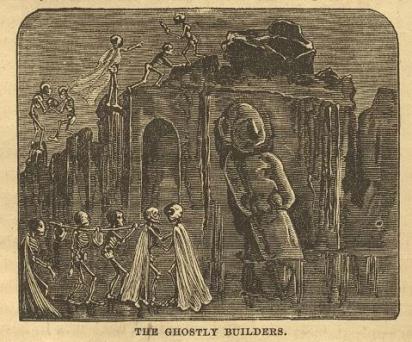 You would seldom get to your Amen before you would have to hoist your umbrella. And there was a large temple near at hand which was built in a single night, in the midst of storm and thunder and rain, by the ghastly hands of dead men! Tradition says that by the |
weird glare of the lightning a noiseless multitude of phantoms were seen at their strange labor far up the mountain side at dead of night — flitting hither and thither and bearing great lava-blocks clasped in their nerveless fingers — appearing and disappearing as the pallid lustre fell upon their forms and faded away again. Even to this day, it is said, the natives hold this dread structure in awe and reverence, and will not pass by it in the night. At noon I observed a bevy of nude native young ladies bathing in the sea, and went and sat down on their clothes to keep them from being stolen. I begged them to come out, for the sea was rising and I was satisfied that they were running some risk. But they were not afraid, and presently went on with their sport. They were finished swimmers and divers, 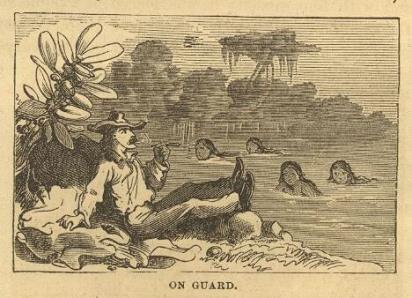 and enjoyed themselves to the last degree. They swam races, splashed and ducked and tumbled each other about, and filled the air with their laughter. It is said that the first thing an Islander learns is how to swim; learning to walk being a matter of smaller consequence, comes afterward. One hears tales of native men and women swimming ashore from vessels many miles at sea — more miles, indeed, than I dare vouch for or even mention. And they tell of a native diver who went down in thirty or forty-foot waters and brought up an anvil! I think |
he swallowed the anvil afterward, if my memory serves me. However I will not urge this point. I have spoken, several times, of the god Lono — I may as well furnish two or three sentences concerning him. The idol the natives worshipped for him was a slender, unornamented staff twelve feet long. Tradition says he was a favorite god on the Island of Hawaii — a great king who had been deified for meritorious services — just our own fashion of rewarding heroes, with the difference that we would have made him a Postmaster instead of a god, no doubt. In an angry moment he slew his wife, a goddess named Kaikilani Aiii. Remorse of conscience drove him mad, and tradition presents us the singular spectacle of a god traveling "on the shoulder;" for in his gnawing grief he wandered about from place to place boxing and wrestling with all whom he met. Of course this pastime soon lost its novelty, inasmuch as it must necessarily have been the case that when so powerful a deity sent a frail human opponent "to grass" he never came back any more. Therefore, he instituted games called makahiki, and ordered that they should be held in his honor, and then sailed for foreign lands on a three-cornered raft, stating that he would return some day — and that was the last of Lono. He was never seen any more; his raft got swamped, perhaps. But the people always expected his return, and thus they were easily led to accept Captain Cook as the restored god. Some of the old natives believed Cook was Lono to the day of their death; but many did not, for they could not understand how he could die if he was a god. Only a mile or so from Kealakekua Bay is a spot of historic interest — the place where the last battle was fought for idolatry. Of course we visited it, and came away as wise as most people do who go and gaze upon such mementoes of the past when in an unreflective mood. While the first missionaries were on their way around the Horn, the idolatrous customs which had obtained in the island, as far back as tradition reached were suddenly broken up. Old |
Kamehameha I., was dead, and his son, Liholiho, the new King was a free liver, a roystering, dissolute fellow, and hated the restraints of the ancient tabu. His assistant in the Government, Kaahumanu, the Queen dowager, was proud and high-spirited, and hated the tabu because it restricted the privileges of her sex and degraded all women very nearly to the level of brutes. So the case stood. Liholiho had half a mind to put his foot down, Kaahumahu had a whole mind to badger him into doing it, and whiskey did the rest. It was probably the rest. It was probably the first time whiskey ever prominently figured as an aid to civilization. Liholiho came up to Kailua as drunk as a piper, and attended a great feast; the determined Queen spurred his drunken courage up to a reckless pitch, and then, while all the multitude stared in blank dismay, he moved deliberately forward and sat down 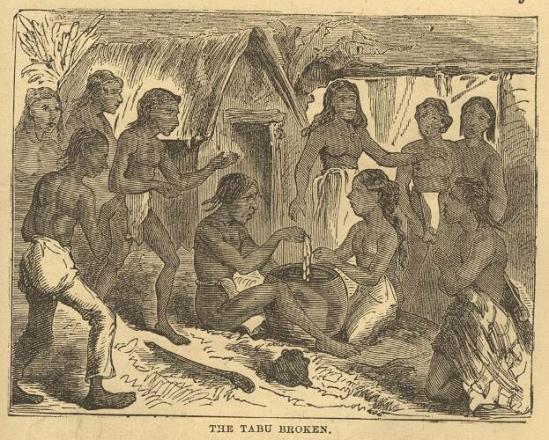 with the women! They saw him eat from the same vessel with them, and were appalled! Terrible moments drifted slowly by, and still the King ate, |
still he lived, still the lightnings of the insulted gods were withheld! Then conviction came like a revelation — the superstitions of a hundred generations passed from before the people like a cloud, and a shout went up, "the tabu is broken! the tabu is broken!" Thus did King Liholiho and his dreadful whiskey preach the first sermon and prepare the way for the new gospel that was speeding southward over the waves of the Atlantic. The tabu broken and destruction failing to follow the awful sacrilege, the people, with that childlike precipitancy which has always characterized them, jumped to the conclusion that their gods were a weak and wretched swindle, just as they formerly jumped to the conclusion that Captain Cook was no god, merely because he groaned, and promptly killed him without stopping to inquire whether a god might not groan as well as a man if it suited his convenience to do it; and satisfied that the idols were powerless to protect themselves they went to work at once and pulled them down — hacked them to pieces — applied the torch — annihilated them! The pagan priests were furious. And well they might be; they had held the fattest offices in the land, and now they were beggared; they had been great — they had stood above the chiefs — and now they were vagabonds. They raised a revolt; they scared a number of people into joining their standard, and Bekuokalani, an ambitious offshoot of royalty, was easily persuaded to become their leader. In the first skirmish the idolaters triumphed over the royal army sent against them, and full of confidence they resolved to march upon Kailua. The King sent an envoy to try and conciliate them, and came very near being an envoy short by the operation; the savages not only refused to listen to him, but wanted to kill him. So the King sent his men forth under Major General Kalaimoku and the two host met a Kuamoo. The battle was long and fierce — men and women fighting side by side, as was the custom — and when the day was done the rebels were flying in every direction in hopeless panic, and idolatry and the tabu were dead in the land! |
The royalists marched gayly home to Kailua glorifying the new dispensation. "There is no power in the gods," said they; "they are a vanity and a lie. The army with idols was weak; the army without idols was strong and victorious!" The nation was without a religion. The missionary ship arrived in safety shortly afterward, timed by providential exactness to meet the emergency, and the Gospel was planted as in a virgin soil. 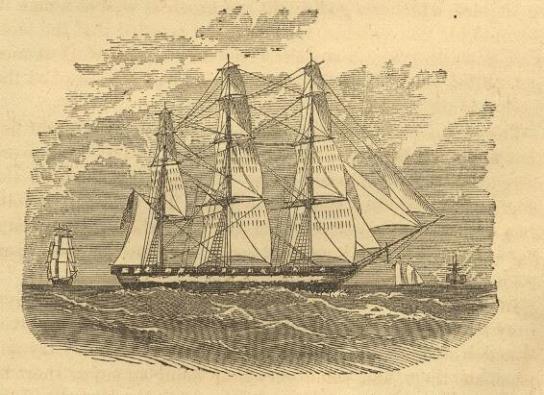 |
CHAPTER LXXIII.At noon, we hired a Kanaka to take us down to the ancient ruins at Honaunau in his canoe — price two dollars — reasonable enough, for a sea voyage of eight miles, counting both ways. The native canoe is an irresponsible looking contrivance. I cannot think of anything to liken it to but a boy’s sled runner hollowed out, and that does not quite convey the correct idea. It is about fifteen feet long, high and pointed at both ends, is a foot and a half or two feet deep, and so narrow that if you wedged a fat man into it you might not get him out again. It sits on top of the water like a duck, but it has an outrigger and does not upset easily, if you keep still. This outrigger is formed of two long bent sticks like plow handles, which project from one side, and to their outer ends is bound a curved beam composed of an extremely light wood, which skims along the surface of the water and thus saves you from an upset on that side, while the outrigger’s weight is not so easily lifted as to make an upset on the other side a thing to be greatly feared. Still, until one gets used to sitting perched upon this knifeblade, he is apt to reason within himself that it would be more comfortable if there were just an outrigger or so on the other side also. I had the bow seat, and Billings sat amidships and faced the Kanaka, who occupied the stern of the craft and did the paddling. With the first stroke the trim shell of a thing shot out |
from the shore like an arrow. There was not much to see. While we were on the shallow water of the reef, it was pastime to look down into the limpid depths at the large bunches of branching coral — the unique shrubbery of the sea. We lost that, though, when we got out into the dead blue water of the deep. But we had the picture of the surf, then, dashing angrily against the crag-bound shore and sending a foaming spray high into the air. There was interest in this beetling border, too, for it was honey-combed with quaint caves and arches and tunnels, and had 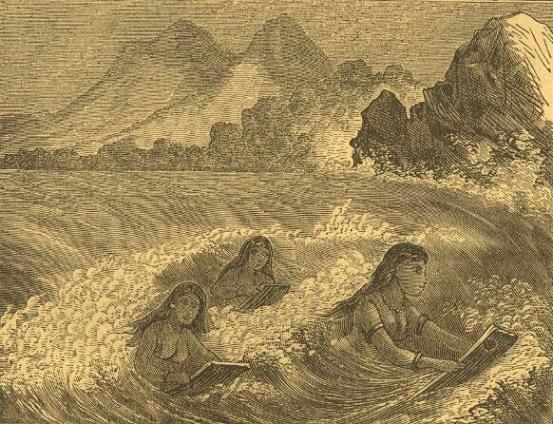 a rude semblance of the dilapidated architecture of ruined keeps and castles rising out of the restless sea. When this novelty ceased to be a novelty, we turned our eyes shoreward and gazed at the long mountain with its rich green forests stretching up into the curtaining clouds, and at the specks of houses in the rearward distance and the diminished schooner riding sleepily at anchor. And when these grew tiresome we dashed boldly into the midst of a school of huge, |
beastly porpoises engaged at their eternal game of arching over a wave and disappearing, and then doing it over again and keeping it up — always circling over, in that way, like so many well-submerged wheels. But the porpoises wheeled themselves away, and then we were thrown upon our own resources. It did not take many minutes to discover that the sun was blazing like a bonfire, and that the weather was of a melting temperature. It had a drowsing effect, too. In one place we came upon a large company of naked natives, of both sexes and all ages, amusing themselves with the national pastime of surf-bathing. Each heathen would paddle three or four hundred yards out to sea, (taking a short board with him), then face the shore and wait for a particularly prodigious billow to come along; at the right moment he would fling his board upon its foamy crest and himself upon the board, and here he would come whizzing by like a bombshell! It did not seem that a lightning express train could shoot along at a more hair-lifting speed. I tried surf-bathing once, subsequently, but made a failure of it. I got the board placed right, and At the end of an hour, we had made the four miles, and landed on a level point of land, upon which was a wide extent of old ruins, with many a tall cocoanut tree growing among them. Here was the ancient City of Refuge — a vast inclosure, whose stone walls were twenty feet thick at the base, |
and fifteen feet high; an oblong square, a thousand and forty feet one way and a fraction under seven hundred the other. Within this inclosure, in early times, has been three rude temples; each two hundred and ten feet long by one hundred wide, and thirteen high. In those days, if a man killed another anywhere on the island the relatives were privileged to take the murderer’s life; and then a chase for life and liberty began — the outlawed criminal flying through pathless forests and over mountain and plain, with his hopes fixed upon the protecting walls of the City of Refuge, and the avenger of blood following hotly after him! Sometimes the race was kept up to the very gates of the temple, and the panting pair sped through long files of excited natives, who watched the contest with flashing eye and dilated nostril, encouraging the hunted refugee with sharp, inspiriting ejaculations, and sending up a ringing shout of exultation when the saving gates closed upon him and the cheated pursuer sank 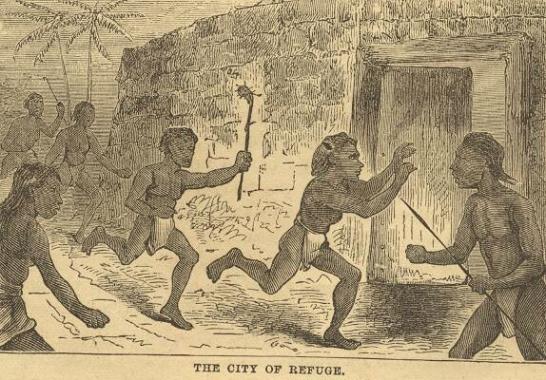 exhausted at the threshold. But sometimes the flying criminal fell under the hand of the avenger at the very door, when one more brave stride, one more brief second of time would have |
brought his feet upon the sacred ground and barred him against all harm. Where did these isolated pagans get this idea of a City of Refuge — this ancient Oriental custom? This old sanctuary was sacred to all — even to rebels in arms and invading armies. Once within its walls, and confession made to the priest and absolution obtained, the wretch with a price upon his head could go forth without fear and without danger — he was tabu, and to harm him was death. The routed rebels in the lost battle for idolatry fled to this place to claim sanctuary, and many were thus saved. Close to the corner of the great inclosure is a round structure of stone, some six or eight feet high, with a level top about ten or twelve in diameter. This was the place of execution. A high palisade of cocoanut piles shut out the cruel scenes from the vulgar multitude. Here criminals were killed, the flesh stripped from the bones and burned, and the bones secreted in holes in the body of the structure. If the man had been guilty of a high crime, the entire corpse was burned. The walls of the temple are a study. The same food for speculation that is offered the visitor to the Pyramids of Egypt he will find here — the mystery of how they were constructed by a people unacquainted with science and mechanics. The natives have no invention of their own for hoisting heavy weights, they had no beasts of burden, and they have never even shown any knowledge of the properties of the lever. Yet some of the lava blocks quarried out, brought over rough, broken ground, and built into this wall, six or seven feet from the ground, are of prodigious size and would weigh tons. How did they transport and how raise them? Both the inner and outer surfaces of the walls present a smooth front and are very creditable specimens of masonry. The blocks are of all manner of shapes and sizes, but yet are fitted together with the neatest exactness. The gradual narrowing of the wall from the base upward is accurately preserved. No cement was used, but the edifice is firm and compact and is capable of resisting storm and decay for centuries. Who |
built this temple, and how was it built, and when, are mysteries that may never be unraveled. Outside of these ancient walls lies a sort of coffin-shaped stone eleven feet four inches long and three feet square at the small end (it would weigh a few thousand pounds), which the high chief who held sway over this district many centuries ago brought thither on his shoulder one day to use as a lounge! This circumstance is established by the most reliable traditions. He used to lie down on it, in his indolent way, and keep an eye on his subjects at work for him and see that there was no "soldiering" done. And no doubt there was not any done to speak of, because he was a man of that sort of build that incites to attention to business on the part of an employee. He was fourteen or fifteen feet high. When he stretched himself at full length on his lounge, his legs hung down over the end, and when he snored he woke the dead. These facts are all attested by irrefragable tradition.  On the other side of the temple is a monstrous seven-ton rock, eleven feet long, seven feet wide and three feet thick. It is raised a foot or a foot and a half above the ground, and rests upon half a dozen little stony pedestals. The same old fourteen-footer brought it down from the mountain, merely for fun (he had his own |
notions about fun), and propped it up as we find it now and as others may find it a century hence, for it would take a score of horses to budge it from its position. They say that fifty or sixty years ago the proud Queen Kaahumanu used to fly to this rock for safety, whenever she had been making trouble with her fierce husband, and hide under it until his wrath was appeased. But these Kanakas will lie, and this statement is one of their ablest efforts — for Kaahumanu was six feet high — she was bulky — she was built like an ox — and she could no more have squeezed herself under that rock than she could have passed between the cylinders of a sugar mill. What could she gain by it, even if she succeeded? To be chased and abused by a savage husband could not be otherwise than humiliating to her high spirit, yet it could never make her feel so flat as an hour’s repose under that rock would. We walked a mile over a raised macadamized road of uniform width; a road paved with flat stones and exhibiting in its every detail a considerable degree of engineering skill. Some say that that wise old pagan, Kamehameha I planned and built it, but others say it was built so long before his time that the knowledge of who constructed it has passed out of the traditions. In either case, however, as the handiwork of an untaught and degraded race it is a thing of pleasing interest. The stones are worn and smooth, and pushed apart in places, so that the road has the exact appearance of those ancient paved highways leading out of Rome which one sees in pictures. The object of our tramp was to visit a great natural curiosity at the base of the foothills — a congealed cascade of lava. Some old forgotten volcanic eruption sent its broad river of fire down the mountain side here, and it poured down in a great torrent from an overhanging bluff some fifty feet high to the ground below. The flaming torrent cooled in the winds from the sea, and remains there to-day, all seamed, and frothed and rippled a petrified Niagara. It is very picturesque, and withal so natural that one might almost imagine it still flowed. A smaller stream trickled over the cliff and built up an isolated pyramid |
about thirty feet high, which has the semblance of a mass of large gnarled and knotted vines and roots and stems intricately twisted and woven together. We passed in behind the cascade and the pyramid, and found the bluff pierced by several cavernous tunnels, whose crooked courses we followed a long distance. Two of these winding tunnels stand as proof of Nature’s mining abilities. Their floors are level, they are seven feet wide, and their roofs are gently arched. Their height is not uniform, however. We passed through one a hundred feet long, which leads through a spur of the hill and opens out well up in the sheer wall of a precipice whose foot rests in the waves of the sea. It is a commodious tunnel, except that there are occasional places in it where one must stoop to pass under. The roof is lava, of course, and is thickly studded with little lava-pointed icicles an inch long, which hardened as they dripped. They project as closely together as the iron teeth of a corn-sheller, and if one will stand up straight and walk any distance there, he can get his hair combed free of charge. 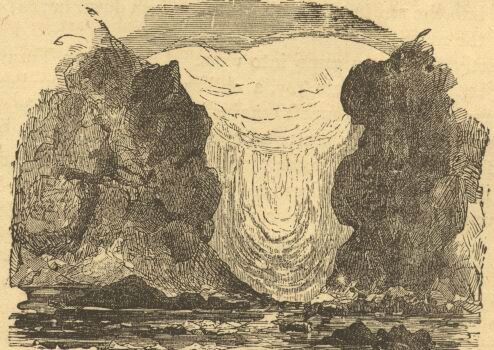 |
CHAPTER LXXIV.We got back to the schooner in good time, and then sailed down to Kau, where we disembarked and took final leave of the vessel. Next day we bought horses and bent our way over the summer-clad mountain-terraces, toward the great volcano of Kilauea (Ke-low-way-ah). We made nearly a two days’ journey of it, but that was on account of laziness. Toward sunset on the second day, we reached an elevation of some four thousand feet above sea level, and as we picked our careful way through billowy wastes of lava long generations ago stricken dead and cold in the climax of its tossing fury, we began to come upon signs of the near presence of the volcano — signs in the nature of ragged fissures that discharged jets of sulphurous vapor into the air, hot from the molten ocean down in the bowels of the mountain. Shortly the crater came into view. I have seen Vesuvius since, but it was a mere toy, a child’s volcano, a soup-kettle, compared to this. Mount Vesuvius is a shapely cone thirty-six hundred feet high; its crater an inverted cone only three hundred feet deep, and not more than a thousand feet in diameter, if as much as that; its fires meagre, modest, and docile. — But here was a vast, perpendicular, walled cellar, nine hundred feet deep in some places, thirteen hundred in others, level- floored, and ten miles in circumference! Here was a yawning pit upon whose floor the armies of Russia could camp, and have room to spare. Perched upon the edge of the crater, at the opposite end |
from where we stood, was a small look-out house — say three miles away. It assisted us, by comparison, to comprehend and appreciate the great depth of the basin — it looked like a tiny martin-box clinging at the eaves of a cathedral. After some little time spent in resting and looking and ciphering, we hurried on to the hotel. By the path it is half a mile from the Volcano House to the lookout- house. After a hearty supper we waited until it was thoroughly dark and then started to A colossal column of cloud towered to a great height in the air immediately above the crater, and the outer swell of every one of its vast folds was dyed with a rich crimson luster, which was subdued to a pale rose tint in the depressions between. It glowed like a muffled torch and stretched upward to a dizzy height toward the zenith. I thought it just possible that its like had not been seen since the children of Israel wandered on their long march through the desert so many centuries ago over a path illuminated by the mysterious |
"pillar of fire." And I was sure that I now had a vivid conception of what the majestic "pillar of fire" was like, which almost amounted to a revelation. Arrived at the little thatched lookout house, we rested our elbows on the railing in front and looked abroad over the wide crater and down over the sheer precipice at the seething fires beneath us. The view was a startling improvement on my daylight experience. I turned to see the effect on the balance of the company and found the reddest-faced set of men I almost ever saw. In the strong light every countenance glowed like red-hot iron, every shoulder was suffused with crimson and shaded rearward into dingy, shapeless obscurity! The place below looked like the infernal regions and these men like half-cooled devils just come up on a furlough. I turned my eyes upon the volcano again. The "cellar" was tolerably well lighted up. For a mile and a half in front of us and half a mile on either side, the floor of the abyss was magnificently illuminated; beyond these limits the mists hung down their gauzy curtains and cast a deceptive gloom over all that made the twinkling fires in the remote corners of the crater seem countless leagues removed — made them seem like the camp-fires of a great army far away. Here was room for the imagination to work! You could imagine those lights the width of a continent away — and that hidden under the intervening darkness were hills, and winding rivers, and weary wastes of plain and desert — and even then the tremendous vista stretched on, and on, and on! — to the fires and far beyond! You could not compass it — it was the idea of eternity made tangible — and the longest end of it made visible to the naked eye! The greater part of the vast floor of the desert under us was as black as ink, and apparently smooth and level; but over a mile square of it was ringed and streaked and striped with a thousand branching streams of liquid and gorgeously brilliant fire! It looked like a colossal railroad map of the State of Massachusetts done in chain lightning on a midnight sky. Imagine it — im- |
agine a coal-black sky shivered into a tangled net-work of angry fire! Here and there were gleaming holes a hundred feet in diameter, broken in the dark crust, and in them the melted lava — the color a dazzling white just tinged 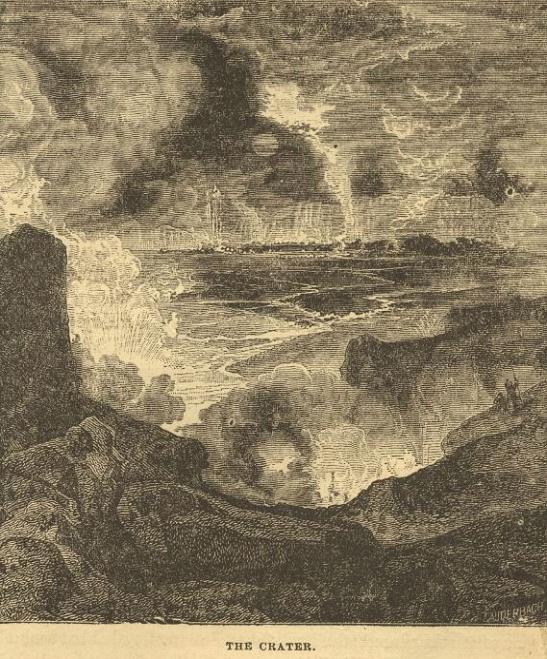 with yellow — was boiling and surging furiously; and from these holes branched numberless bright torrents in many directions, like the spokes of a wheel, and kept a tolerably straight course for a while and then |
swept round in huge rainbow curves, or made a long succession of sharp worm-fence angles, which looked precisely like the fiercest jagged lightning. These streams met other streams, and they mingled with and crossed and recrossed each other in every conceivable direction, like skate tracks on a popular skating ground. Sometimes streams twenty or thirty feet wide flowed from the holes to some distance without dividing — and through the opera-glasses we could see that they ran down small, steep hills and were genuine cataracts of fire, white at their source, but soon cooling and turning to the richest red, grained with alternate lines of black and gold. Every now and then masses of the dark crust broke away and floated slowly down these streams like rafts down a river. Occasionally the molten lava flowing under the superincumbent crust broke through — split a dazzling streak, from five hundred to a thousand feet long, like a sudden flash of lightning, and then acre after acre of the cold lava parted into fragments, turned up edgewise like cakes of ice when a great river breaks up, plunged downward and were swallowed in the crimson cauldron. Then the wide expanse of the "thaw" maintained a ruddy glow for a while, but shortly cooled and became black and level again. During a "thaw," every dismembered cake was marked by a glittering white border which was superbly shaded inward by aurora borealis rays, which were a flaming yellow where they joined the white border, and from thence toward their points tapered into glowing crimson, then into a rich, pale carmine, and finally into a faint blush that held its own a moment and then dimmed and turned black. Some of the streams preferred to mingle together in a tangle of fantastic circles, and then they looked something like the confusion of ropes one sees on a ship’s deck when she has just taken in sail and dropped anchor — provided one can imagine those ropes on fire. Through the glasses, the little fountains scattered about looked very beautiful. They boiled, and coughed, and spluttered, and discharged sprays of stringy red fire — of about the consistency of mush, for instance — from ten to fifteen feet into the air, |
along with a shower of brilliant white sparks — a quaint and unnatural mingling of gouts of blood and snow-flakes! We had circles and serpents and streaks of lightning all twined and wreathed and tied together, without a break throughout an area more than a mile square (that amount of ground was covered, though it was not strictly "square"), and it was with a feeling of placid exultation that we reflected that many years had elapsed since any visitor had seen such a splendid display — since any visitor had seen anything more than the now snubbed and insignificant "North" and "South" lakes in action. We had been reading old files of Hawaiian newspapers and the "Record Book" at the Volcano House, and were posted. I could see the North Lake lying out on the black floor away off in the outer edge of our panorama, and knitted to it by a web-work of lava streams. In its individual capacity it looked very little more respectable than a schoolhouse on fire. True, it was about nine hundred feet long and two or three hundred wide, but then, under the present circumstances, it necessarily appeared rather insignificant, and besides it was so distant from us. I forgot to say that the noise made by the bubbling lava is not great, heard as we heard it from our lofty perch. It makes three distinct sounds — a rushing, a hissing, and a coughing or puffing sound; and if you stand on the brink and close your eyes it is no trick at all to imagine that you are sweeping down a river on a large low-pressure steamer, and that you hear the hissing of the steam about her boilers, the puffing from her escape-pipes and the churning rush of the water abaft her wheels. The smell of sulphur is strong, but not unpleasant to a sinner. We left the lookout house at ten o’clock in a half cooked condition, because of the heat from Pele’s furnaces, and wrapping up in blankets, for the night was cold, we returned to our Hotel. |
CHAPTER LXXV.The next night was appointed for a visit to the bottom of the crater, for we desired to traverse its floor and see the "North Lake" (of fire) which lay two miles away, toward the further wall. After dark half a dozen of us set out, with lanterns and native guides, and climbed down a crazy, thousand-foot pathway in a crevice fractured in the crater wall, and reached the bottom in safety. The irruption of the previous evening had spent its force and the floor looked black and cold; but when we ran out upon it we found it hot yet, to the feet, and it was likewise riven with crevices which revealed the underlying fires gleaming vindictively. A neighboring cauldron was threatening to overflow, and this added to the dubiousness of the situation. So the native guides refused to continue the venture, and then every body deserted except a stranger named Marlette. He said he had been in the crater a dozen times in daylight and believed he could find his way through it at night. He thought that a run of three hundred yards would carry us over the hottest part of the floor and leave us our shoe-soles. His pluck gave me back-bone. We took one lantern and instructed the guides to hang the other to the roof of the look-out house to serve as a beacon for us in case we got lost, and then the party started back up the precipice and Marlette and I made our run. We skipped over the hot floor and over the red crevices with brisk dispatch and reached the cold lava safe but with pretty warm feet. Then we took things leisurely and comfortably, |
jumping tolerably wide and probably bottomless chasms, and threading our way through picturesque lava upheavals with considerable confidence. When we got fairly away from the cauldrons of boiling fire, we seemed to be in a gloomy desert, and a suffocatingly dark one, surrounded by dim walls that seemed to tower to the sky. The only cheerful objects were the glinting stars high overhead. By and by Marlette shouted "Stop!" I never stopped quicker in my life. I asked what the matter was. He said we were out of the path. He said we must not try to go on till we found it again, for we were surrounded with beds of rotten lava through which we could easily break and plunge down a thousand feet. I thought eight hundred would answer for me, and was about to say so when Marlette partly proved his statement by accidentally crushing through and disappearing to his arm-pits. He  got out and we hunted for the path with the lantern. He said there was only one path and that it was but vaguely defined. We could not find it. The lava surface was all alike in the lantern light. But he was an ingenious man. He said it was not the lantern that had informed him that we were out of the path, but his feet. He had noticed a crisp grinding of fine lava-needles under his feet, and some instinct reminded him that in the path these were all worn away. So he put the lantern behind him, and began to search with his boots instead of his eyes. It was good sagacity. The |
first time his foot touched a surface that did not grind under it he announced that the trail was found again; and after that we kept up a sharp listening for the rasping sound and it always warned us in time. It was a long tramp, but an exciting one. We reached the North Lake between ten and eleven o’clock, and sat down on a huge overhanging lava-shelf, tired but satisfied. The spectacle presented was worth coming double the distance to see. Under us, and stretching away before us, was a heaving sea of molten fire of seemingly limitless extent. The glare from it was so blinding that it was some time before we could bear to look upon it steadily. It was like gazing at the sun at noon-day, except that the glare was not quite so white. At unequal distances all around the shores of the lake were nearly white-hot chimneys or hollow drums of lava, four or five feet high, and up through them were bursting gorgeous sprays of lava-gouts and gem spangles, some white, some red and some golden — a ceaseless bombardment,  and one that fascinated the eye with its unapproachable splendor. The mere distant jets, sparkling up through an intervening gossamer veil of vapor, |
seemed miles away; and the further the curving ranks of fiery fountains receded, the more fairy-like and beautiful they appeared. Now and then the surging bosom of the lake under our noses would calm down ominously and seem to be gathering strength for an enterprise; and then all of a sudden a red dome of lava of the bulk of an ordinary dwelling would heave itself aloft like an escaping balloon, then burst asunder, and out of its heart would flit a pale-green film of vapor, and float upward and vanish in the darkness — a released soul soaring homeward from captivity with the damned, no doubt. The crashing plunge of the ruined dome into the lake again would send a world of seething billows lashing against the shores and shaking the foundations of our perch. By and by, a loosened mass of the hanging shelf we sat on tumbled into the lake, jarring the surroundings like an earthquake and delivering a suggestion that may have been intended for a hint, and may not. We did not wait to see. We got lost again on our way back, and were more than an hour hunting for the path. We were where we could see the beacon lantern at the look-out house at the time, but thought it was a star and paid no attention to it. We reached the hotel at two o’clock in the morning pretty well fagged out. Kilauea never overflows its vast crater, but bursts a passage for its lava through the mountain side when relief is necessary, and then the destruction is fearful. About 1840 it rent its overburdened stomach and sent a broad river of fire careering down to the sea, which swept away forests, huts, plantations and every thing else that lay in its path. The stream was five miles broad, in places, and two hundred feet deep, and the distance it traveled was forty miles. It tore up and bore away acre-patches of land on its bosom like rafts — rocks, trees and all intact. At night the red glare was visible a hundred miles at sea; and at a distance of forty miles fine print could be read at midnight. The atmosphere was poisoned with sulphurous vapors and choked with falling ashes, pumice stones and cinders; countless columns of smoke rose up and blended together in a tumbled canopy that hid the heavens and glowed with a |
ruddy flush reflected from the fires below; here and there jets of lava sprung hundreds of feet into the air and burst into rocket-sprays that returned to earth in a crimson rain; and all the while the laboring mountain shook with Nature’s great palsy and voiced its distress in moanings and the muffled booming of subterranean thunders. Fishes were killed for twenty miles along the shore, where |
the lava entered the sea. The earthquakes caused some loss of human life, and a prodigious tidal wave swept inland, carrying every thing before it and drowning a number of natives. The devastation consummated along the route traversed by the river of lava was complete and incalculable. Only a Pompeii and a Herculaneum were needed at the foot of Kilauea to make the story of the irruption immortal. |
CHAPTER LXXVI.We rode horseback all around the island of Hawaii (the crooked road making the distance two hundred miles), and enjoyed the journey very much. We were more than a week making the trip, because our Kanaka horses would not go by a house or a hut without stopping — whip and spur could not alter their minds about it, and so we finally found that it economized time to let them have their way. Upon inquiry the mystery was explained: the natives are such thorough-going gossips that they never pass a house without stopping to swap news, and consequently their horses learn to regard that sort of thing as an essential part of the whole duty of man, and his salvation not to be compassed without it. However, at a former crisis of my life I had once taken an aristocratic young lady out driving, behind a horse that had just retired from a long and honorable career as the moving impulse of a milk wagon, and so this present experience awoke a reminiscent sadness in me in place of the exasperation more natural to the occasion. I remembered how helpless I was that day, and how humiliated; how ashamed I was of having intimated to the girl that I had always owned the horse and was accustomed to grandeur; how hard I tried to appear easy, and even vivacious, under suffering that was consuming my vitals; how placidly and maliciously the girl smiled, and kept on smiling, while my hot blushes baked themselves into a permanent blood-pudding in my face; how the horse ambled from one side of the street to the other and waited complacently before every third house |
two minutes and a quarter while I belabored his back and reviled him in my heart; how I tried to keep him from turning corners and failed; how I moved heaven and earth to get him out of town, and did not succeed; how he traversed the entire settlement and delivered imaginary milk at a hundred and sixty-two different domiciles, and how he finally brought up at a dairy depot and refused to budge 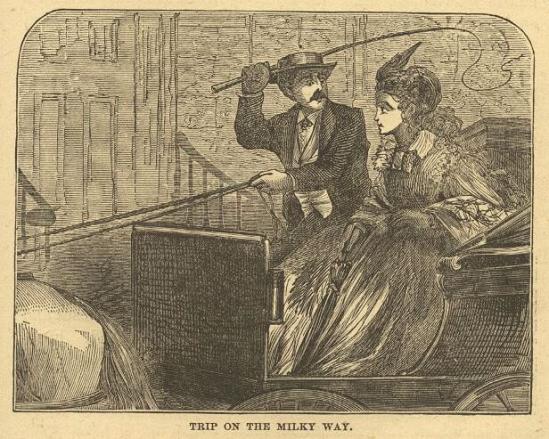 further, thus rounding and completing the revealment of what the plebeian service of his life had been; how, in eloquent silence, I walked the girl home, and how, when I took leave of her, her parting remark scorched my soul and appeared to blister me all over: she said that my horse was a fine, capable animal, and I must have taken great comfort in him in my time — but that if I would take along some milk-tickets next time, and appear to deliver them at the various halting places, it might expedite his movements a little. There was a coolness between us after that. In one place in the island of Hawaii, we saw a laced and |
ruffled cataract of limpid water leaping from a sheer precipice fifteen hundred feet high; but that sort of scenery finds its stanchest ally in the arithmetic rather than in spectacular effect. If one desires to be so stirred by a poem of Nature wrought in the happily commingled graces of picturesque rocks, glimpsed distances, foliage, color, shifting lights and shadows, and failing water, that the tears almost come into his eyes so potent is the charm exerted, he need not go away from America to enjoy such an experience. The Rainbow Fall, in Watkins Glen (N.Y.), on the Erie railway, is an example. It would recede into pitiable insignificance if the callous tourist drew on arithmetic on it; but left to compete for the honors simply on scenic grace and beauty — the grand, the august and the sublime being barred the contest — it could challenge the old world and the new to produce its peer. In one locality, on our journey, we saw some horses that had been born and reared on top of the mountains, above the range of running water, and consequently they had never drank that fluid in their lives, but had been always accustomed to quenching their thirst by eating dew-laden or shower-wetted leaves. And now it was destructively funny to see them sniff suspiciously at a pail of water, and then put in their noses and try to take a bite out of the fluid, as if it were a solid. Finding it liquid, they would snatch away their heads and fall to trembling, snorting and showing other evidences of fright. When they became convinced at last that the water was friendly and harmless, they thrust in their noses up to their eyes, brought out a mouthful of water, and proceeded to chew it complacently. We saw a man coax, kick and spur one of them five or ten minutes before he could make it cross a running stream. It spread its nostrils, distended its eyes and trembled all over, just as horses customarily do in the presence of a serpent — and for aught I know it thought the crawling stream was a serpent. In due course of time our journey came to an end at Kawaehae (usually pronounced To-a-hi — and before we find fault with this elaborate orthographical method of arriving at such |
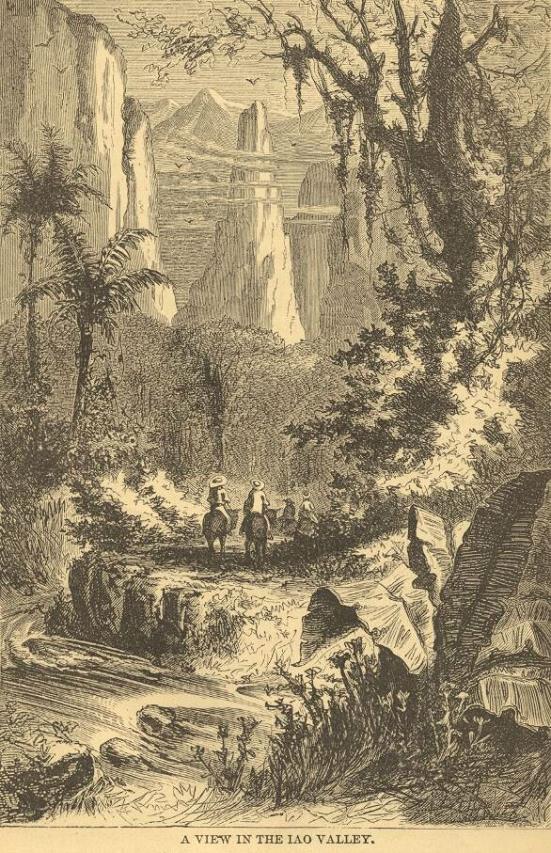 |
an unostentatious result, let us lop off the ugh from our word "though"). I made this horseback trip on a mule. I paid ten dollars for him at Kau (Kah-oo), added four to get him shod, rode him two hundred miles, and then sold him for fifteen dollars. I mark the circumstance with a white stone (in the absence of chalk — for I never saw a white stone that a body could mark anything with, though out of respect for the ancients I have tried it often enough); for up to that day and date it was the first strictly commercial transaction I had ever entered into, and come out winner. We returned to Honolulu, and from thence sailed to the island of Maui, and spent several weeks there very pleasantly. I still remember, with a sense of indolent luxury, a picnicing excursion up a romantic gorge there, called the Iao Valley. The trail lay along the edge of a brawling stream in the bottom of the gorge — a shady route, for it was well roofed with the verdant domes of forest trees. Through openings in the foliage we glimpsed picturesque scenery that revealed ceaseless changes and new charms with every step of our progress. Perpendicular walls from one to three thousand feet high guarded the way, and were sumptuously plumed with varied foliage, in places, and in places swathed in waving ferns. Passing shreds of cloud trailed their shadows across these shining fronts, mottling them with blots; billowy masses of white vapor hid the turreted summits, and far above the vapor swelled a background of gleaming green crags and cones that came and went, through the veiling mists, like islands drifting in a fog; sometimes the cloudy curtain descended till half the cañon wall was hidden, then shredded gradually away till only airy glimpses of the ferny front appeared through it — then swept aloft and left it glorified in the sun again. Now and then, as our position changed, rocky bastions swung out from the wall, a mimic ruin of castellated ramparts and crumbling towers clothed with mosses and hung with garlands of swaying vines, and as we moved on they swung back again and hid themselves once more in the foliage. Presently a verdure-clad needle of stone, a thousand feet high, stepped out from behind a corner, and mounted guard over the mysteries of the valley. It seemed to |
me that if Captain Cook needed a monument, here was one ready made — therefore, why not put up his sign here, and sell out the venerable cocoanut stump? But the chief pride of Maui is her dead volcano of Haleakala — which means, translated, "the house of the sun." We climbed a thousand feet up the side of this isolated colossus one afternoon; then camped, and next day climbed the remaining nine thousand feet, and anchored on the summit, where we built a fire and froze and roasted by turns, all night. With the first pallor of dawn we got up and saw things that were new to us. Mounted on a commanding pinnacle, we watched Nature work her silent wonders. The sea was spread abroad on every hand, its tumbled surface seeming only wrinkled and dimpled in the distance. A broad valley below appeared like an ample checker-board, its velvety green sugar plantations alternating with dun squares of barrenness and groves of trees diminished to mossy tufts. Beyond the valley were mountains picturesquely grouped together; but bear in mind, we fancied that we were looking up at these things — not down. We seemed to sit in the bottom of a symmetrical bowl ten thousand feet deep, with the valley and the skirting sea lifted away into the sky above us! It was curious; and not only curious, but aggravating; for it was having our trouble all for nothing, to climb ten thousand feet toward heaven and then have to look up at our scenery. However, we had to be content with it and make the best of it; for, all we could do we could not coax our landscape down out of the clouds. Formerly, when I had read an article in which Poe treated of this singular fraud perpetrated upon the eye by isolated great altitudes, I had looked upon the matter as an invention of his own fancy. I have spoken of the outside view — but we had an inside one, too. That was the yawning dead crater, into which we now and then tumbled rocks, half as large as a barrel, from our perch, and saw them go careering down the almost perpendicular sides, bounding three hundred feet at a jump; kicking up cast-clouds wherever they struck; diminishing to our view as they sped farther into distance; growing invisible, finally, and |
only betraying their course by faint little puffs of dust; and coming to a halt at last in the bottom of the abyss, two thousand five hundred feet down from where they started! It was magnificent sport. We wore ourselves out at it. 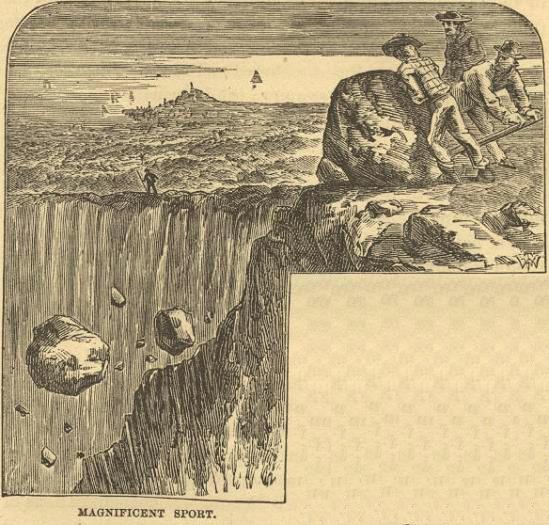 The crater of Vesuvius, as I have before remarked, is a modest pit about a thousand feet deep and three thousand in circumference; that of Kilauea is somewhat deeper, and ten miles in circumference. But what are either of them compared to the vacant stomach of Haleakala? I will not offer any figures of my own, but give official ones — those of Commander Wilkes, U.S.N., who surveyed it and testifies that it is twenty-seven miles in circumference! If it had a level bottom it would make a fine site for a city like London. It must have afforded a spectacle worth contemplating in the old days when its furnaces gave full rein to their anger. Presently vagrant white clouds came drifting along, high over the sea and the valley; then they came in couples and groups; then in imposing squadrons; gradually joining their forces, they banked themselves solidly together, a thousand |
feet under us, and totally shut out land and ocean — not a vestige of anything was left in view but just a little of the rim of the crater, circling away from the pinnacle whereon we sat (for a ghostly procession of wanderers from the filmy hosts without had drifted through a chasm in the crater wall and filed round and round, and gathered and sunk and blended together till the abyss was stored to the brim with a fleecy fog). Thus banked, motion ceased, and silence reigned. Clear to the horizon, league on league, the snowy floor stretched without a break — not level, but in rounded folds, with shallow creases between, and with here and there stately piles of vapory architecture lifting themselves aloft out of the common plain — some near at hand, some in the middle distances, and others relieving the monotony of the remote solitudes. There was little conversation, for the impressive scene overawed speech. I felt like the Last Man, neglected of the judgment, and left pinnacled in mid-heaven, a forgotten relic of a vanished world. While the hush yet brooded, the messengers of the coming resurrection appeared in the East. A growing warmth suffused the horizon, and soon the sun emerged and looked out over the cloud-waste, flinging bars of ruddy light across it, staining its folds and billow-caps with blushes, purpling the shaded troughs between, and glorifying the massy vapor-palaces and cathedrals with a wasteful splendor of all blendings and combinations of rich coloring. It was the sublimest spectacle I ever witnessed, and I think the memory of it will remain with me always. |
CHAPTER LXXVII.I stumbled upon one curious character in the Island of Maui. He became a sore annoyance to me in the course of time. My first glimpse of him was in a sort of public room in the town of Lahaina. He occupied a chair at the opposite side of the apartment, and sat eyeing our party with interest for some minutes, and listening as critically to what we were saying as if he fancied we were talking to him and expecting him to reply. I thought it very sociable in a stranger. Presently, in the course of conversation, I made a statement bearing upon the subject under discussion — and I made it with due modesty, for there was nothing extraordinary about it, and it was only put forth in illustration of a point at issue. I had barely finished when this person spoke out with rapid utterance and feverish anxiety: "Oh, that was certainly remarkable, after a fashion, but you ought to have seen my chimney — you ought to have seen my chimney, sir! Smoke! I wish I may hang if — Mr. Jones, you remember that chimney — you must remember that chimney! No, no — I recollect, now, you warn’t living on this side of the island then. But I am telling you nothing but the truth, and I wish I may never draw another breath if that chimney didn’t smoke so that the smoke actually got caked in it and I had to dig it out with a pickaxe! You may smile, gentlemen, but the High Sheriff’s got a hunk of it which I dug out before his eyes, and so it’s perfectly easy for you to go and examine for yourselves." The interruption broke up the conversation, which had al- |
ready begun to lag, and we presently hired some natives and an out-rigger canoe or two, and went out to overlook a grand surf-bathing contest. Two weeks after this, while talking in a company, I looked up and detected this same man boring through and through me with his intense eye, and noted again his twitching muscles and his feverish anxiety to speak. The moment I paused, he said: "Beg your pardon, sir, beg your pardon, but it can only be considered remarkable when brought into strong outline by isolation. Sir, contrasted with a circumstance which occurred in my own experience, it instantly becomes commonplace. No, not that — for I will not speak so discourteously of any experience in the career of a stranger and a gentleman — but I am obliged to say that you could not, and you would not ever again refer to this tree as a large one, if you could behold, as I have, the great Yakmatack tree, in the island of Ounaska, sea of Kamtchatka — a tree, sir, not one inch less than four hundred and fifteen feet in solid diameter! — and I wish I may die in a minute if it isn’t so! Oh, you needn’t look so questioning, gentlemen; here’s old Cap Saltmarsh can say whether I know what I’m talking about or not. I showed him the tree." Captain Saltmarsh. — "Come, now, cat your anchor, lad — you’re heaving too taut. You promised to show me that stunner, and I walked more than eleven mile with you through the cussedest jungle I ever see, a hunting for it; but the tree you showed me finally warn’t as big around as a beer cask, and you know that your own self, Markiss." "Hear the man talk! Of course the tree was reduced that way, but didn’t I explain it? Answer me, didn’t I? Didn’t I say I wished you could have seen it when I first saw it? When you got up on your ear and called me names, and said I had brought you eleven miles to look at a sapling, didn’t I explain to you that all the whale-ships in the North Seas had been wooding off of it for more than twenty-seven years? And did you s’pose the tree could last for-ever, con-found it? I |
don’t see why you want to keep back things that way, and try to injure a person that’s never done you any harm." Somehow this man’s presence made me uncomfortable, and I was glad when a native arrived at that moment to say that Muckawow, the most companionable and 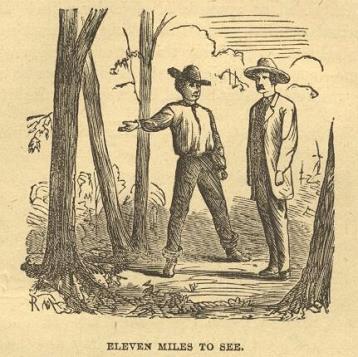 luxurious among the rude war-chiefs of the Islands, desired us to come over and help him enjoy a missionary whom he had found trespassing on his grounds. I think it was about ten days afterward that, as I finished a statement I was making for the instruction of a group of friends and acquaintances, and which made no pretence of being extraordinary, a familiar voice chimed instantly in on the heels of my last word, and said: "But, my dear sir, there was nothing remarkable about that horse, or the circumstance either — nothing in the world! I mean no sort of offence when I say it, sir, but you really do not know anything whatever about speed. Bless your heart, if you could only have seen my mare Margaretta; there was a beast! — there was lightning for you! Trot! Trot is no name |
for it — she flew! How she could whirl a buggy along! I started her out once, sir — Colonel Bilgewater, you recollect that animal perfectly well — I started her out about thirty or thirty-five yards ahead of the awfullest storm I ever saw in my life, and it chased us upwards of eighteen miles! It did, by the everlasting hills! And I’m telling you nothing but the unvarnished truth when I say that not one single drop of rain fell on me — not a single drop, sir! And I swear to it! But my dog was a-swimming behind the wagon all the way!" 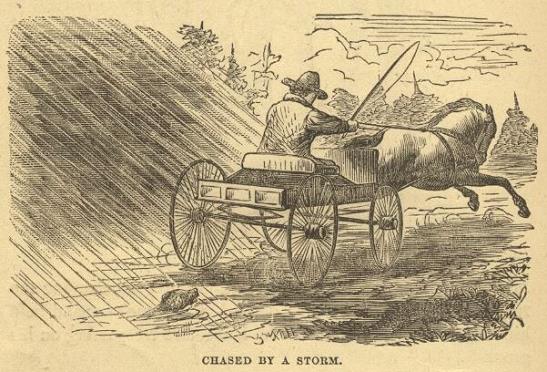 For a week or two I stayed mostly within doors, for I seemed to meet this person everywhere, and he had become utterly hateful to me. But one evening I dropped in on Captain Perkins and his friends, and we had a sociable time. About ten o’clock I chanced to be talking about a merchant friend of mine, and without really intending it, the remark slipped out that he was a little mean and parsimonious about paying his workmen. Instantly, through the steam of a hot whiskey punch on the opposite side of the room, a remembered voice shot — and for a moment I trembled on the imminent verge of profanity: |
"Oh, my dear sir, really you expose yourself when you parade that as a surprising circumstance. Bless your heart and hide, you are ignorant of the very A B C of meanness! ignorant as the unborn babe! ignorant as unborn twins! You don’t know |
he went out of sight! Presently he came in sight again, looking like a little small bee — and he came along down further and further, till he looked as big as a doll again — and down further and further, till he was as big as a boy again — and further and further, till he was a full-sized man once more; and then him and his crowbar came a wh-izzing down and lit right exactly in the same old tracks and went to r-ramming down, and r-ramming down, and r-ramming down again, just the same as if nothing had happened! Now do you know, that poor cuss warn’t gone only sixteen minutes, and yet that Incorporated Company of Mean Men docked him for the lost time!" I said I had the headache, and so excused myself and went home. And on my diary I entered "another night spoiled" by this offensive loafer. And a fervent curse was set down with it to keep the item company. And the very next day I packed up, out of all patience, and left the Island. Almost from the very beginning, I regarded that man as a liar . . . .
The line of points represents an interval of years. At the end of which time the opinion hazarded in that last sentence came to be gratifyingly and remarkably endorsed, and by wholly disinterested persons. The man Markiss was found one morning hanging to a beam of his own bedroom (the doors and windows securely fastened on the inside), dead; and on his breast was pinned a paper in his own handwriting begging his friends to suspect no innocent person of having any thing to do with his death, for that it was the work of his own hands entirely. Yet the jury brought in the astounding verdict that deceased came to his death "by the hands of some person or persons unknown!" They explained that the perfectly undeviating consistency of Markiss’s character for thirty years towered aloft as colossal and indestructible testimony, that whatever statement he chose to make was entitled to instant and unquestioning acceptance as a lie. And they furthermore stated their belief that he was not dead, and instanced the |
strong circumstantial evidence of his own word that he was dead — and beseeched the coroner to delay the funeral as long as possible, which was done. And so in the tropical climate of Lahaina the coffin stood open for seven days, and then even the loyal jury gave him up. But they sat on him again, and changed their verdict to "suicide induced by mental aberration" — because, said they, with penetration, "he said he was dead, and he was dead; and would he have told the truth if he had been in his right mind? No, sir."  |
CHAPTER LXXIII.After half a year’s luxurious vagrancy in the islands, I took shipping in a sailing vessel, and regretfully returned to San Francisco — a voyage in every way delightful, but without an incident: unless lying two long weeks in a dead calm, eighteen hundred miles from the nearest land, may rank as an incident. Schools of whales grew so tame that day after day they played about the ship among the porpoises and the sharks without the least apparent fear of us, and we pelted them with empty bottles for lack of better sport. Twenty-four hours afterward these bottles would be still lying on the glassy water under our noses, showing that the ship had not moved out of her place in all that time. The calm was absolutely breathless, and the surface of the sea absolutely without a wrinkle. For a whole day and part of a night we lay so close to another ship that had drifted to our vicinity, that we carried on conversations with her passengers, introduced each other by name, and became pretty intimately acquainted with people we had never heard of before, and have never heard of since. This was the only vessel we saw during the whole lonely voyage. We had fifteen passengers, and to show how hard pressed they were at last for occupation and amusement, I will mention that the gentlemen gave a good part of their time every day, during the calm, to trying to sit on an empty champagne bottle (lying on its side), and thread a needle without touching their heels to the deck, or falling over; and the ladies sat in the shade of the |
mainsail, and watched the enterprise with absorbing interest. We were at sea five Sundays; and yet, but for the almanac, we never would have known but that all the other days were Sundays too. 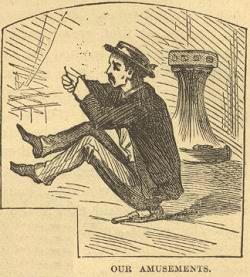
I was home again, in San Francisco, without means and without employment. I tortured my brain for a saving scheme of some kind, and at last a public lecture occurred to me! I sat down and wrote one, in a fever of hopeful anticipation. I showed it to several friends, but they all shook their heads. They said nobody would come to hear me, and I would make a humiliating failure of it. They said that as I had never spoken in public, I would break down in the delivery, anyhow. I was disconsolate now. But at last an editor slapped me on the back and told me to "go ahead." He said, "Take the largest house in town, and charge a dollar a ticket." The audacity of the proposition was charming; it seemed fraught with practical worldly wisdom, however. The proprietor of the several theatres endorsed the advice, and said I might have his handsome new opera-house at half price — fifty dollars. In sheer desperation I took it — on credit, for sufficient reasons. In three days I did a hundred and fifty dollars’ worth of printing and advertising, and was the most distressed and frightened creature on the Pacific coast. I could not sleep — who could, under such circumstances? For other people there was facetiousness in the last line of my posters, but to me it was plaintive with a pang when I wrote it: "Doors open at 7 1/2. The trouble will begin at 8."
That line has done good service since. Showmen have borrowed it frequently. I have even seen it appended to a |
newspaper advertisement reminding school pupils in vacation what time next term would begin. As those three days of suspense dragged by, I grew more and more unhappy. I had sold two hundred tickets among my personal friends, but I feared they might not come. My lecture, which had seemed "humorous" to me, at first, grew steadily more and more dreary, till not a vestige of fun seemed left, and I grieved that I could not bring a coffin on the stage and turn the thing into a funeral. I was so panic-stricken, at last, that I went to three old friends, giants in stature, cordial by nature, and stormy-voiced, and said: "This thing is going to be a failure; the jokes in it are so dim that nobody will ever see them; I would like to have you sit in the parquette, and help me through." They said they would. Then I went to the wife of a popular citizen, and said that if she was willing to do me a very great kindness, I would be glad if she and her husband would sit prominently in the left-hand stage- box, where the whole house could see them. I explained that I should need help, and would turn toward her and smile, as a signal, when I had been delivered of an obscure joke — "and then," I added, "don’t wait to investigate, but respond!" She promised. Down the street I met a man I never had seen before. He had been drinking, and was beaming with smiles and good nature. He said: "My name’s Sawyer. You don’t know me, but that don’t matter. I haven’t got a cent, but if you knew how bad I wanted to laugh, you’d give me a ticket. Come, now, what do you say?" "Is your laugh hung on a hair-trigger? — that is, is it critical, or can you get it off easy?" My drawling infirmity of speech so affected him that he laughed a specimen or two that struck me as being about the article I wanted, and I gave him a ticket, and appointed him to sit in the second circle, in the centre, and be responsible for that division of the house. I gave him minute instructions about how to detect indistinct jokes, and then went away, and left him chuckling placidly over the novelty of the idea. |
I ate nothing on the last of the three eventful days — I only suffered. I had advertised that on this third day the box-office would be opened for the sale of reserved seats. I crept down to the theater at four in the afternoon to see if any sales had been made. The ticket seller was gone, the box-office was locked up. I had to swallow suddenly, or my heart would have got out. "No sales," I said to myself; "I might |
by the fierce glare of the lights, and quaking in every limb with a terror that seemed like to take my life away. The house was full, aisles and all! The tumult in my heart and brain and legs continued a full minute before I could gain any command over myself. Then I recognized the charity and the friendliness in the faces before me, and little by little my fright melted away, and I began to talk. Within 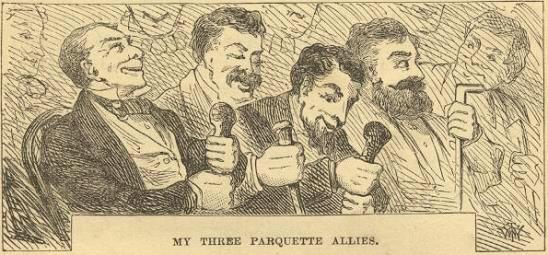 three or four minutes I was comfortable, and even content. My three chief allies, with three auxiliaries, were on hand, in the parquette, all sitting together, all armed with bludgeons, and all ready to make an onslaught upon the feeblest joke that might show its head. And whenever a joke did fall, their bludgeons came down and their faces seemed to split from ear to ear; Sawyer, whose hearty countenance was seen looming redly in the centre of the second circle, took it up, and the house was carried handsomely. Inferior jokes never fared so royally before. Presently I delivered a bit of serious matter with impressive unction (it was my pet), and the audience listened with an absorbed hush that gratified me more than any applause; and as I dropped the last
All the papers were kind in the morning; my appetite returned; I had a abundance of money. All’s well that ends well. |
|
Notes.
|
|
Source.
Mark Twain, 1835-1910.
Last updated by Tom Tyler, Denver, CO, USA, Mar 31, 2023
|
|